Wisconsin Documents
Quitclaim Deed
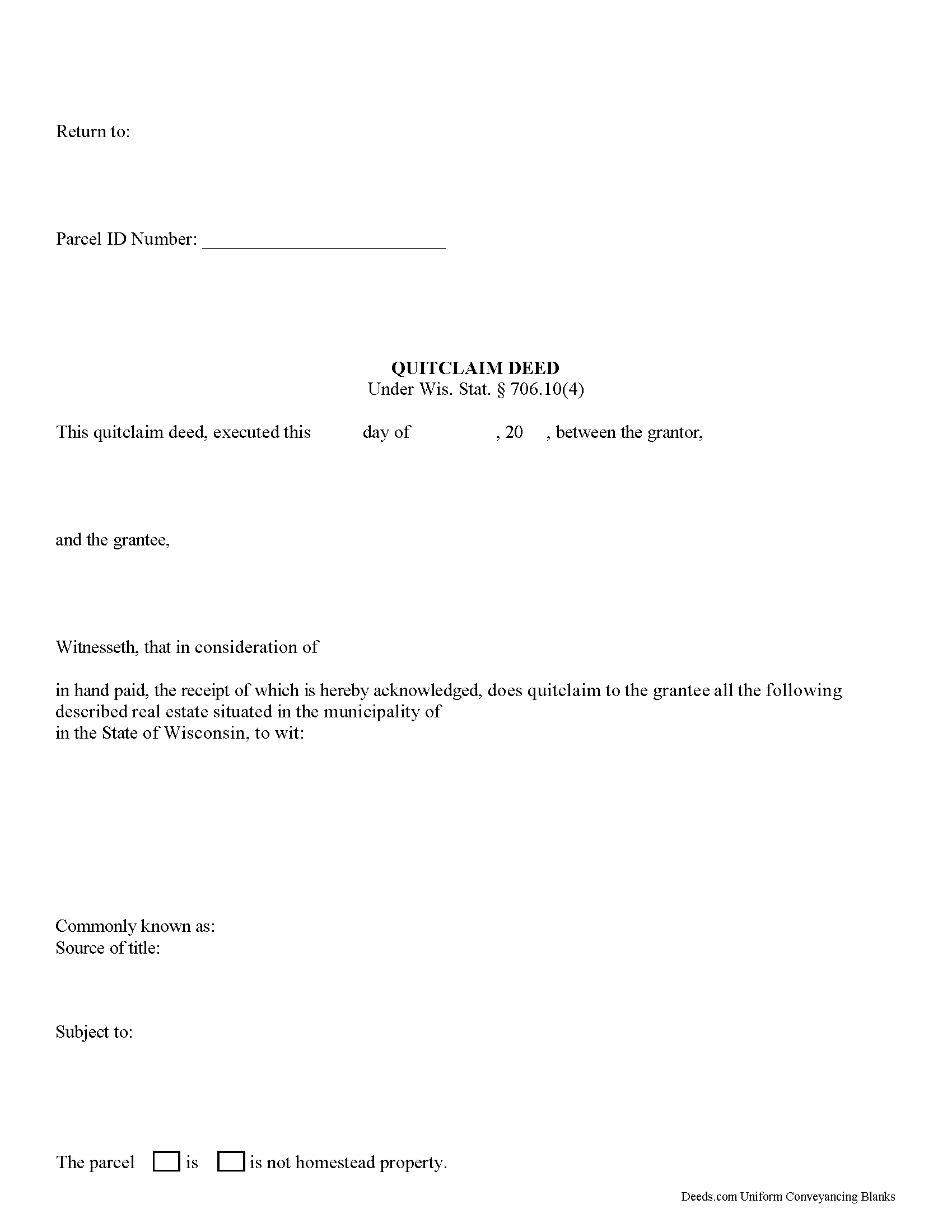
A quitclaim deed, according to the prerequisites for transfers as defined under section 706.02 (1) of the Wisconsin Annotated Statutes, needs to identify the parties, the land, and the interest conveyed along with any material terms or conditions. The grantor's signature is needed in order to record a quitclaim deed. If the conveyance alienates any interest of a married person in a homestead under Sec. 706.01(7) of the Wisconsin Annotated Statutes, it must be signed or joined in a separate conveyance on behalf of each spouse. The Register of Deeds can refuse to record a quitclaim deed unless specific standardization requirements are met. These standardization requirements are further explained below according to county.
The first recorded quitclaim deed will have priority over later recordings involving the same real estate. The Wisconsin Annotated Statutes 706.08(1) permit that if a quitclaim deed is not recorded, it is "void as against any subsequent purchaser, in good faith and for a valuable consideration, of the same real estate or any portion of the same real estate whose conveyance is recorded first". This is known as a race-notice statute recording act, which does not c... More Information about the Wisconsin Quitclaim Deed
Gift Deed
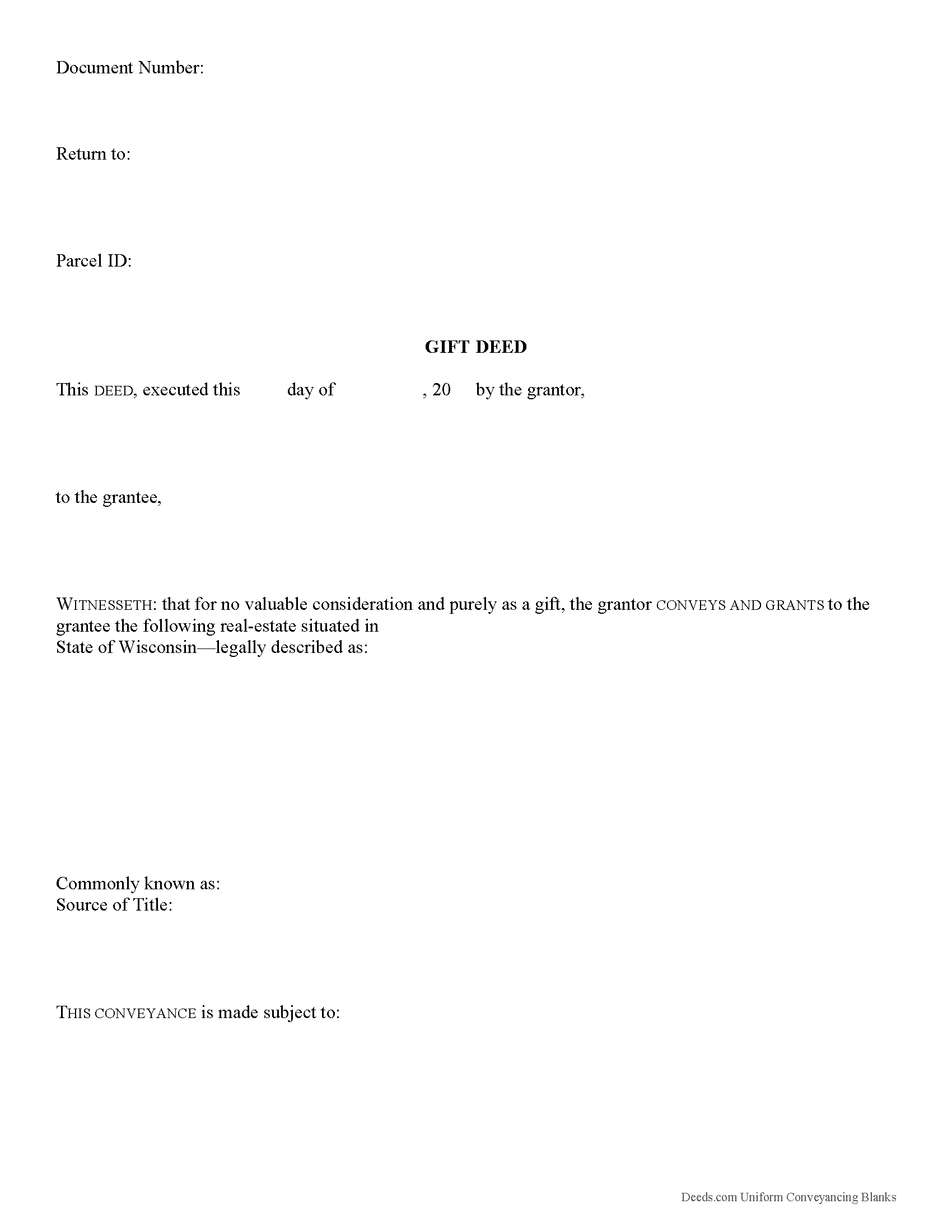
Gifts of Real Estate in Wisconsin
A gift deed, or deed of gift, is a legal document voluntarily transferring title to real property from one party (the grantor or donor) to another (the grantee or donee). A gift deed typically transfers real property between family or close friends. Gift deeds are also used to donate to a non-profit organization or charity. The deed serves as proof that the transfer is indeed a gift and without consideration (any conditions or form of compensation).
In order for a gift deed to be valid they must meet the following requirements: The grantor must intend to make a present gift of the property, the grantor must deliver the property to the grantee, and the grantee must accept the gift. A gift deed must contain language that explicitly states no consideration is expected or required, because any ambiguity or reference to consideration can make the deed contestable in court. A promise to transfer ownership in the future is not a gift, and any deed that does not immediately transfer the interest in the property, or meet any of the aforementioned requirements, can be revoked [1].
A lawful gift deed includes the grantor's full name and marital stat... More Information about the Wisconsin Gift Deed
Warranty Deed
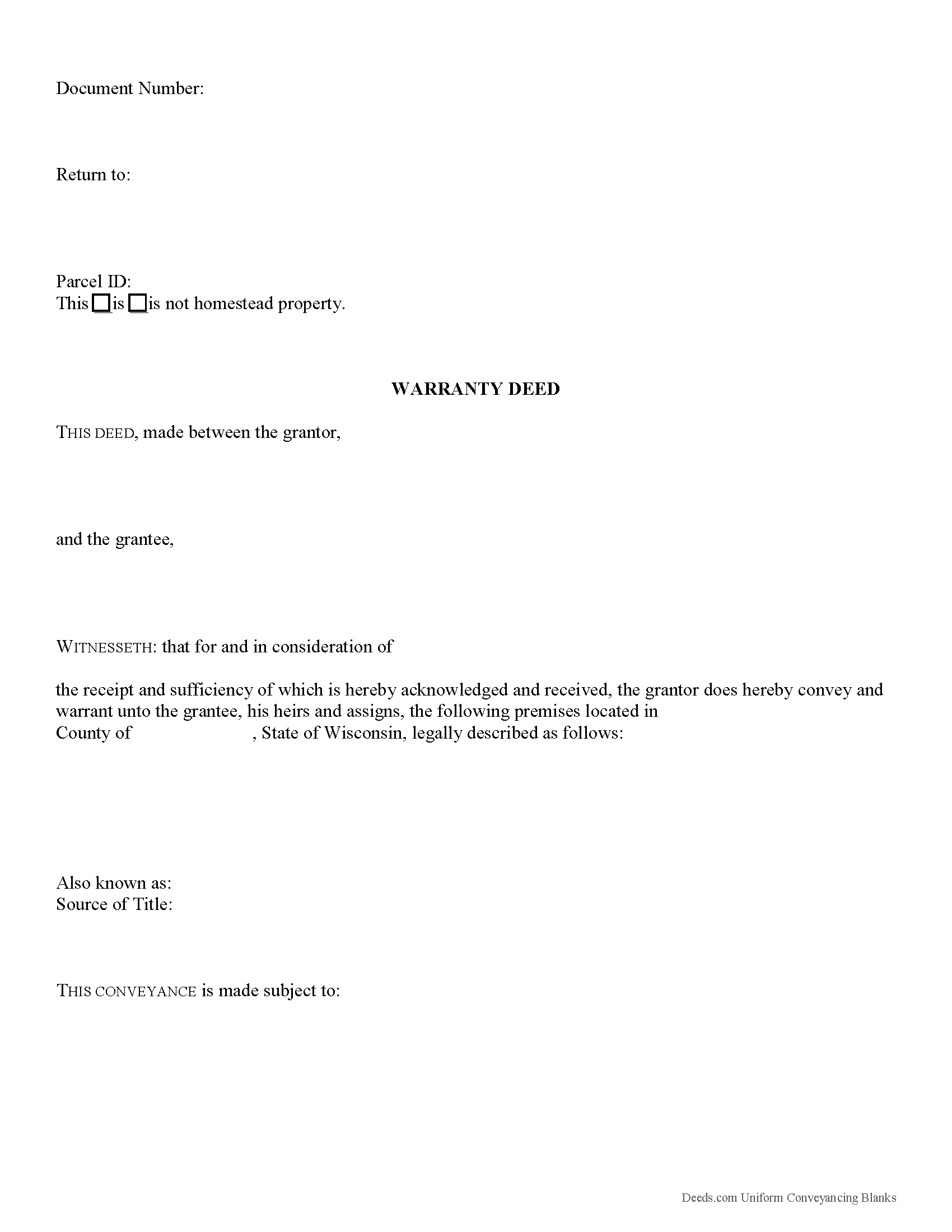
In Wisconsin, title to real property can be transferred from one party to another using a warranty deed. When recorded, a warranty deed conveys an interest in real property to the named grantee with full warranties of title.
A warranty deed offers the most assurance of title. This assurance is greater than that of a limited or special warranty deed, which guarantees the title only against claims that arose during the time the grantor held title to the property, or a quitclaim deed, which offers no warranties of title.
As defined in section 706.10(5) of the Wisconsin Statutes, a warranty deed conveys real property in fee simple to the grantee and contains covenants by the grantor that he or she holds title to the property and has "good right to convey the same land or its title." The grantor guarantees that the property is "free from all encumbrance" and that he or she will "guarantee and defend the title and quiet possession of the land against all lawful claims whatever originating prior to the conveyance" (706.10(5)). A warranty deed is recognizable by the terms "convey and warrant," but no warranties are implied in Wisconsin, so theses covenants must be explicitly stated ... More Information about the Wisconsin Warranty Deed
Special Warranty Deed
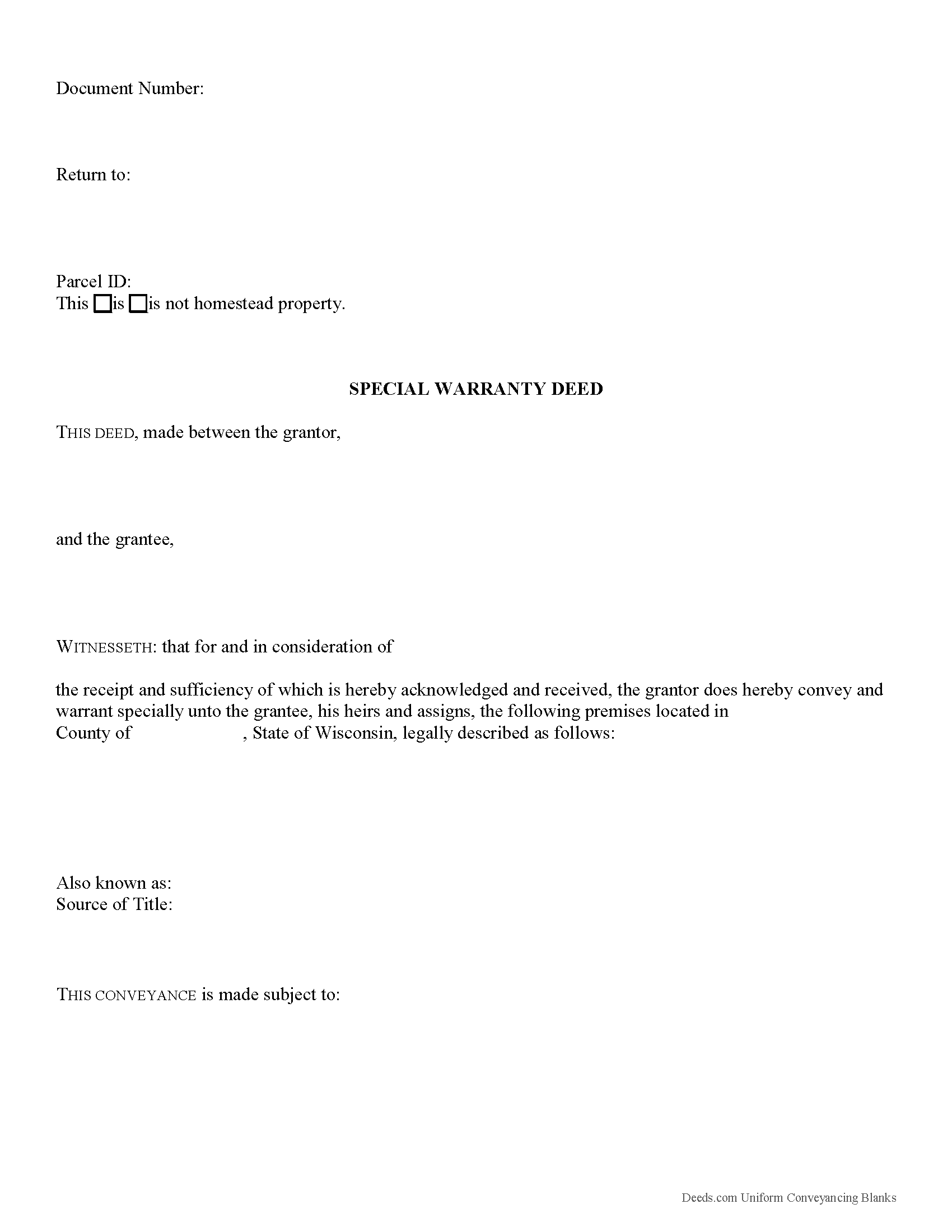
In Wisconsin, title to real property can be transferred from one party to another using a special warranty deed. When recorded, a special warranty deed conveys an interest in real property to the named grantee with limited warranties of title.
A special warranty deed offers a more limited warranty than a general warranty deed. Special warranty deeds convey real property in fee simple to the grantee, typically with a covenant from the grantor that the property is free from encumbrances made by the grantor. The grantor also covenants that he will defend title against any lawful claim arising by, through, or under the grantor, but none other. This means that the deed will not protect the grantee against title issues that arose prior to the time the grantor acquired title. A special warranty deed is recognizable by the terms "convey and warrant specially," but no warranties are implied in Wisconsin, so any special warranty covenants must be explicitly stated in the deed (706.10(6)).
In addition to meeting all state and local standards for recorded documents, a lawful special warranty deed includes the grantor's full name, mailing address, and marital status, the consideration gi... More Information about the Wisconsin Special Warranty Deed
Grant Deed
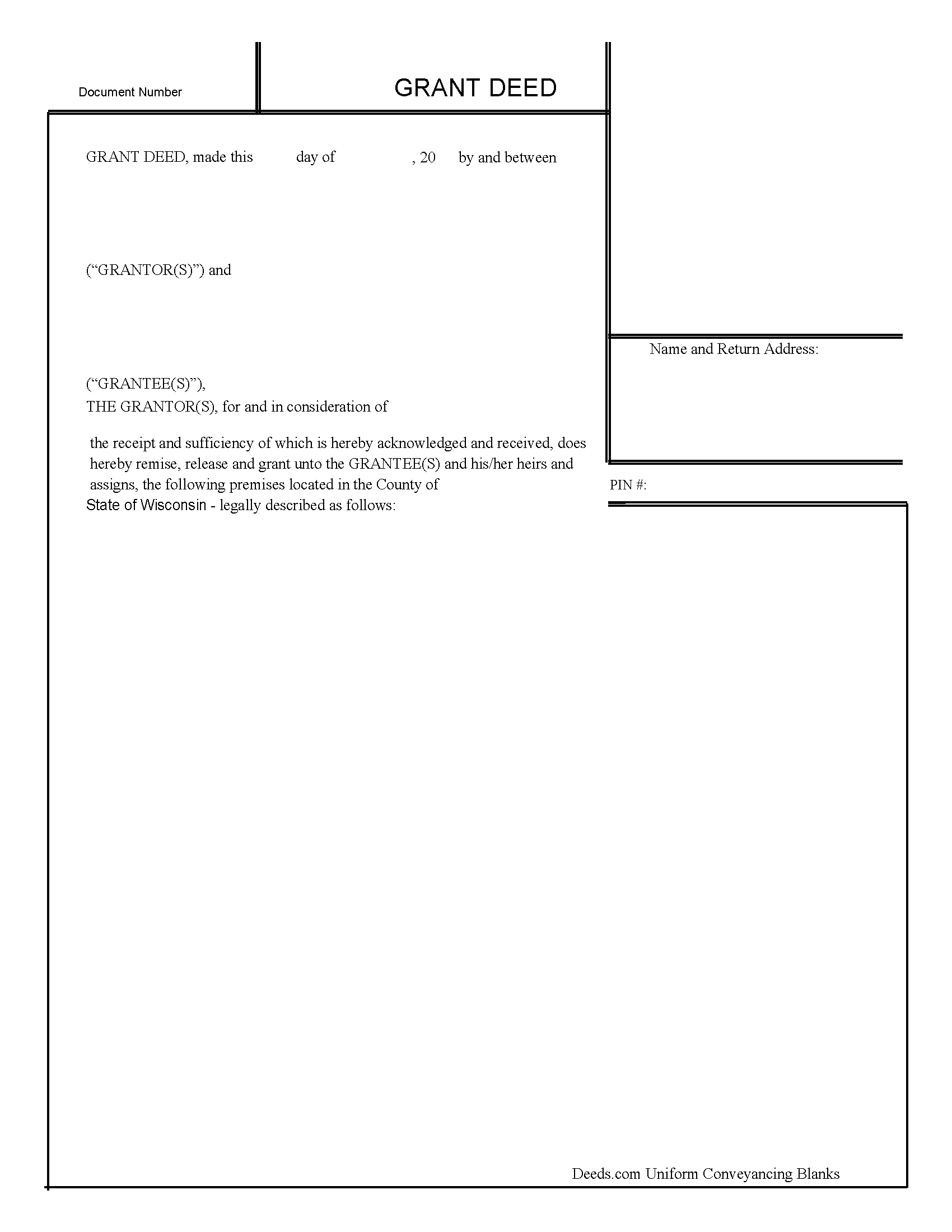
Title to real property in Wisconsin can be transferred with a grant deed. Wisconsin conveyancing forms are not codified.
Every conveyance in Wisconsin will pass all the estate or interest of the grantor, unless a different intention is expressed directly or by implication in the deed (706.10(3)). No warranty or covenant is implied in any conveyance in Wisconsin, whether or not such conveyance contains special warranties or covenants (706.10(6)). In a grant deed, the grantor warrants that he has not previously conveyed the property to anyone other than the grantee and that he has not encumbered the property. Further, a grant deed will convey the grantor's after-acquired title, unless limited by specific words contained in the deed.
The grantor in a grant deed is required to sign the deed and have his or her signature acknowledge or otherwise authenticated according to the laws of the state. Any of the officers listed in 706.06 can authenticate an instrument in Wisconsin. Notarial acts can be performed in Wisconsin or in another state. In either case, a notarial act must be certified by a certificate of acknowledgment (706.07). Acknowledgments taken in Wisconsin can be taken ... More Information about the Wisconsin Grant Deed
Correction Deed
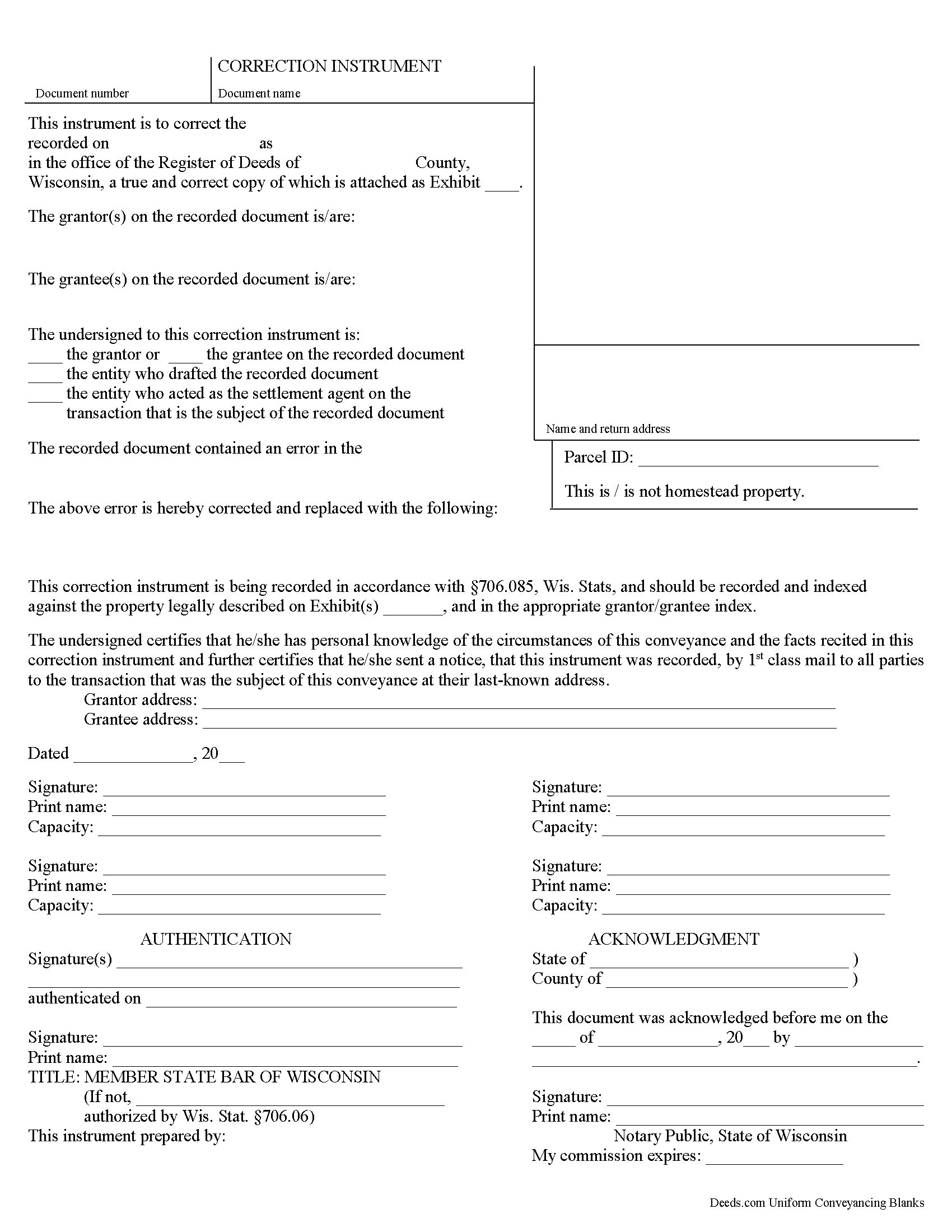
Use the correction instrument to correct an error in a deed in Wisconsin.
Since 2010 Wisconsin statutes have allowed for a correction instrument that can be used to correct any of the following (706.085, Wis. Stats.):
* An error in the legal description, "including a distance; angle; direction; bearing; chord; lot, block, unit, or building number or letter; appurtenant easement; section number; township name or number; municipality, county, or state name; range number or meridian; certified survey map number; or subdivision or condominium name."
* The addition, correction, or clarification of other information on the deed: party's name, including spelling; a first or middle name or initial; a name suffix; alternate names by which the party is known; and description of an entity as corporation, company, or similar identifier.
* An error in one of the following items on the deed: marital status; date of execution; homestead designation; tax parcel number; identity of the drafter; recording data for an instrument referenced; nature and purpose of conveyance; title of it; facts relating to or addition of an acknowledgement or authentication; disclaimer by a grantee; and a... More Information about the Wisconsin Correction Deed
Easement Deed
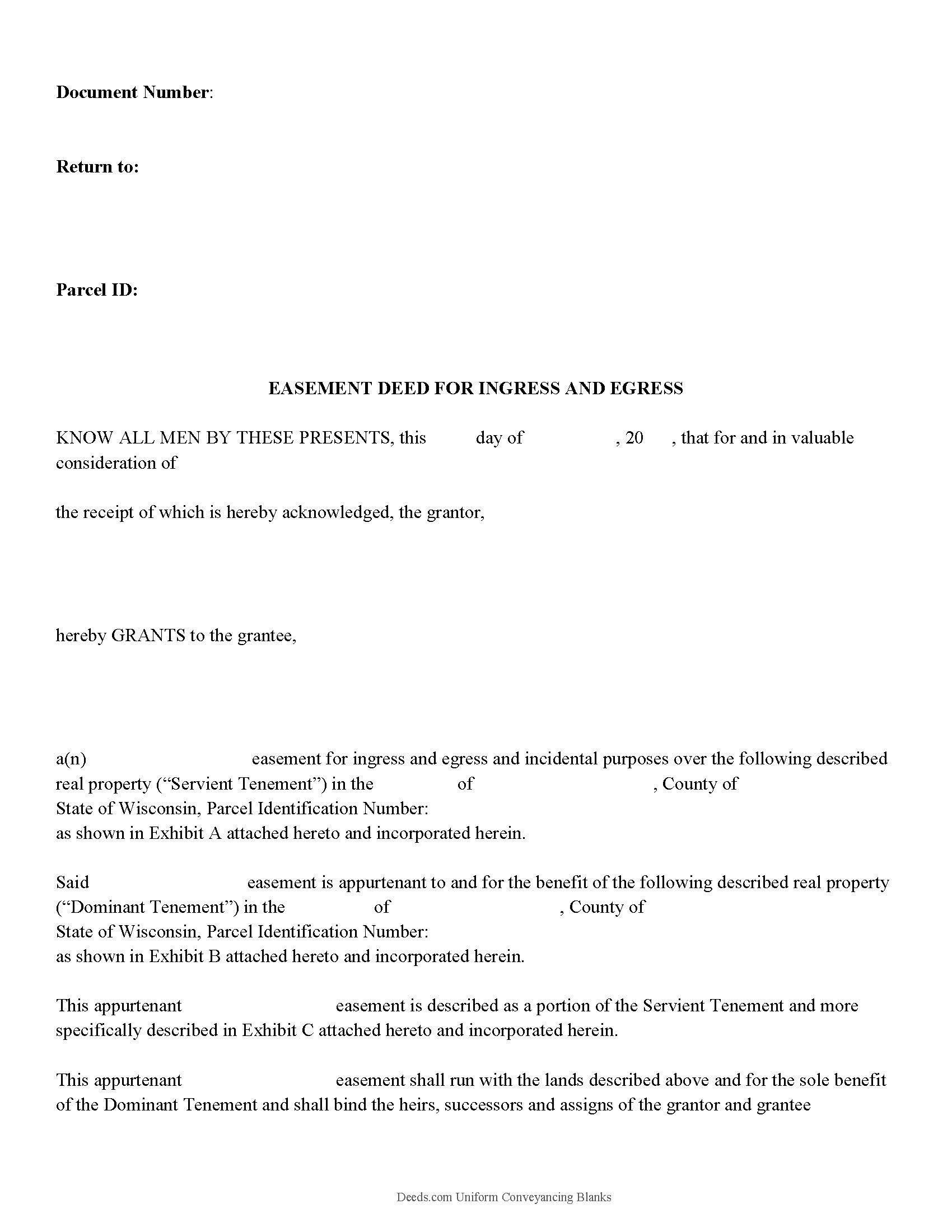
Easements are non-possessory interests in real property that allow one person to use another's real property for a specific purpose. Easements are commonly created for rights of use. The Wisconsin statutes mention only a few specific easements, such as a renewable energy resource easement and conservation easements. A renewable energy resource easement is one that limits the height or location, or both, of permissible development on the burdened land in terms of a structure or vegetation for the purpose of providing access to the benefitted land to wind or sunlight passing over the burdened land. This type of easement should be created in writing and is subject to the same conveyancing and recording requirements as other easements in this state. Renewable energy resource easements run with the land benefitted and burdened unless the document states otherwise (700.35). An easement deed should detail the scope and duration of the easement, and should also provide a legal description.
In order to be valid, an easement deed should be signed by the grantor, and the signature should be acknowledged or otherwise authenticated according to the laws of the state. Any of the officers lis... More Information about the Wisconsin Easement Deed
Termination of Easement
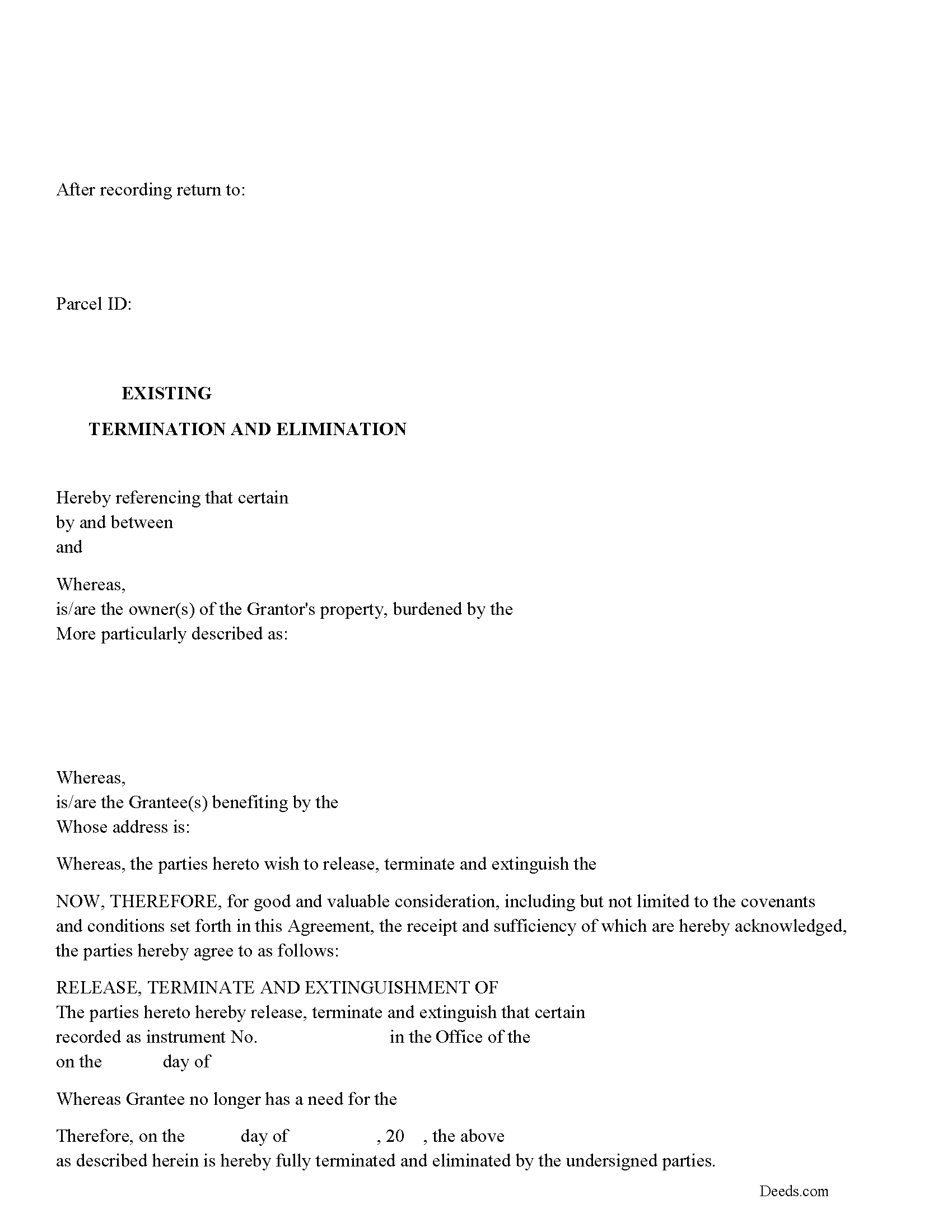
Use this form to release, terminate, extinguish a previously recorded document that involves access to and from a property.
Documents such as:
1. Easement Deeds or Agreements (An easement is a non-possessory interest in land, granting the right to use someone else's property for a specific purpose, like a driveway or utility line)
2. Access Roads
3. Right of Ways
4. Utility Easements (Power, Gas, Water, Sewer, Etc.)
5. Drainage Easements
This document allows the owner of the land, burdened by the access and the party that benefits from the access, to sign an agreement releasing the property from such access, ... More Information about the Wisconsin Termination of Easement
Mineral Deed
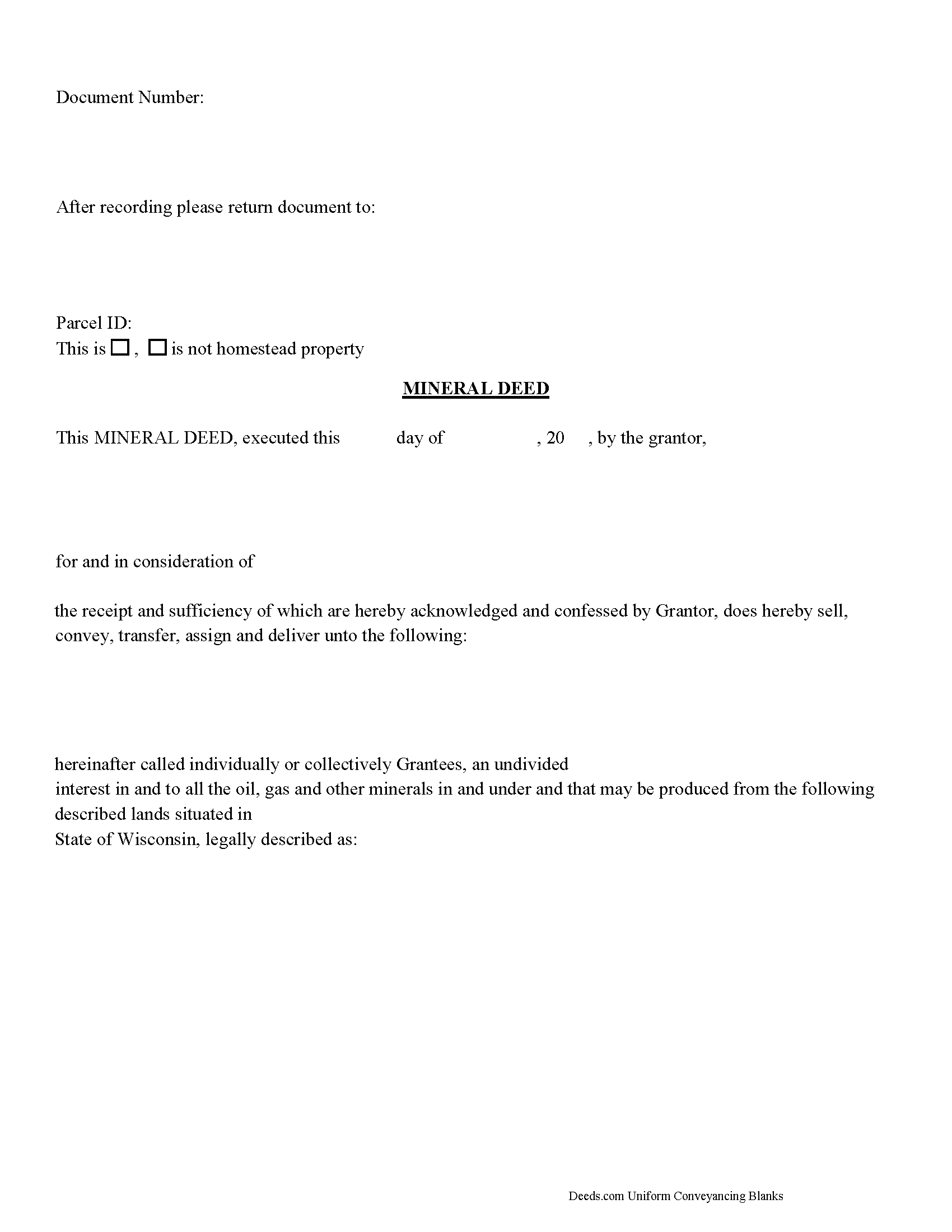
The General Mineral Deed in Wisconsin transfers oil, gas, and mineral rights from the grantor to the grantee. THIS IS NOT A LEASE. There are no Exceptions or Reservations included.
The transfer includes the oil, gas and other minerals of every kind and nature. It also transfers any and all rights to receive royalties, overriding royalties, net profits interests or other payments out of or with respect to those oil, gas and other minerals. The Grantor can stipulate the percentage of Mineral Rights the Grantee will receive and is made subject to any rights existing under any valid and subsisting oil and gas lease or leases of record.
This general mineral deed gives the grantee the right to access, for the purpose of mining, drilling, exploring, operating and developing said lands for oil, gas, and other minerals, and storing handling, transporting and marketing of such.
In this document the Grantor Warrants and will defend said Title to Grantee. Use of this document has a permanent effect on your rights to the property, if you are not completely sure of what you are executing seek the advice of a legal professional.
(Wisconsin MD Package includes form, guidelines, and com... More Information about the Wisconsin Mineral Deed
Mineral Deed with Quitclaim Covenants
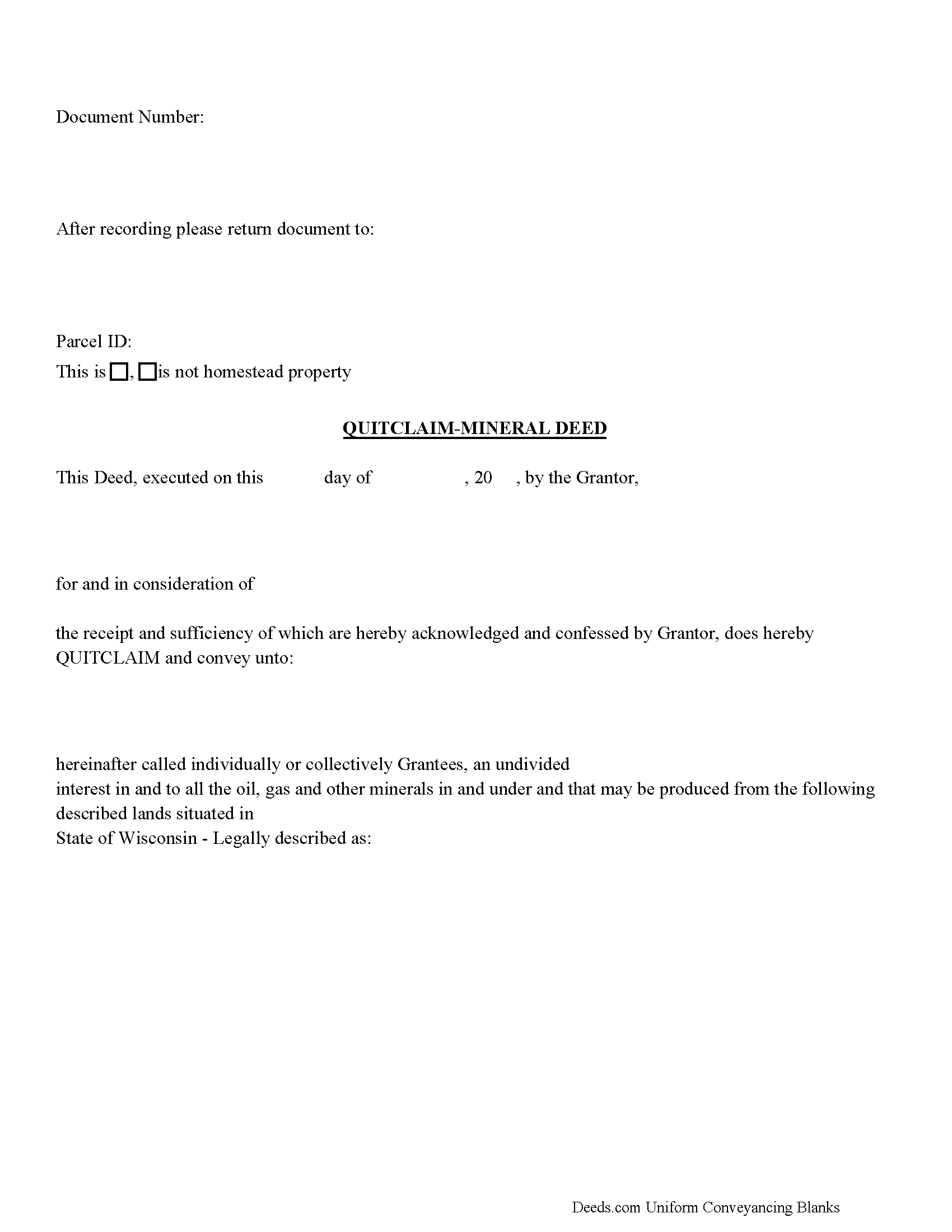
The General Mineral Deed in Wisconsin Quitclaims oil, gas, and mineral rights from the grantor to the grantee. THIS IS NOT A LEASE. There are no Exceptions or Reservations included.
The transfer includes the oil, gas and other minerals of every kind and nature. The Grantor can stipulate the percentage of Mineral Rights the Grantee will receive.
This general mineral deed gives the grantee the right to access, for the purpose of mining, drilling, exploring, operating and developing said lands for oil, gas, and other minerals, and storing handling, transporting and marketing of such.
The seller, or grantor Quitclaims the mineral rights and does NOT accept responsibility to any discrepancy of title (This assignment is without warranty of title, either express or implied)
Uses: Mineral deeds with quitclaim are often used in situations where the grantor wants to quickly release any interest they might have in mineral rights, such as in settling estates, resolving disputes, clearing up uncertainties about ownership in a title's history or when mineral rights have previously been severed or fragmented from surface rights and cloud a title, making it difficult to transfer proper... More Information about the Wisconsin Mineral Deed with Quitclaim Covenants
Special Power of Attorney for the Purchase of Property
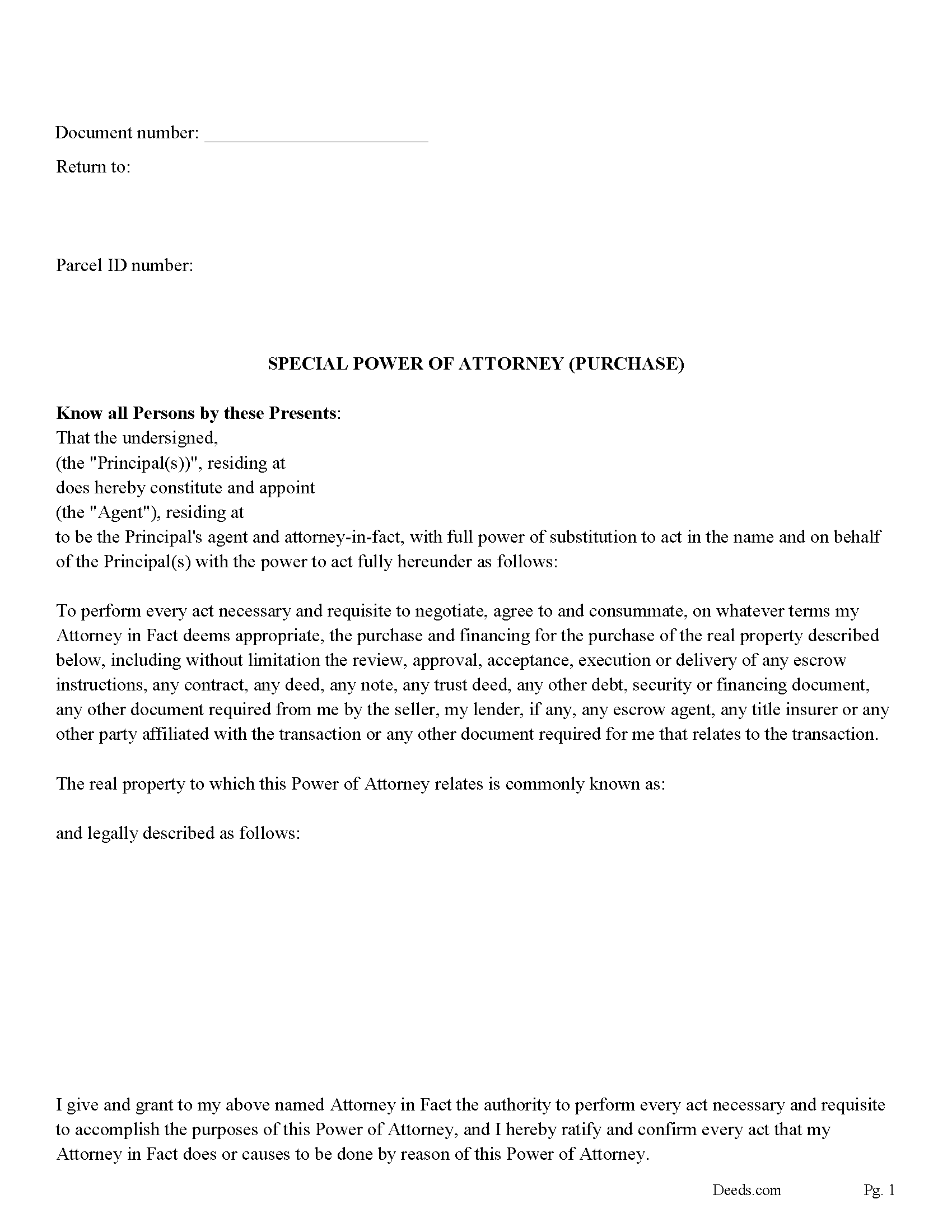
Use this form (Principal) to allow a second party, your Agent, to purchase a property on your behalf. Your agent can perform all tasks necessary to purchase and finance a specific property located in the State of Wisconsin, in your place and stead as if you were present yourself.
This power of attorney is not affected by any subsequent disability or incapacity of the principal and shall be considered a "Durable Power of Attorney." (ii) shall be governed, as to its validity, terms and enforcement, by those laws of the State of Wisconsin that apply to instruments negotiated, executed, delivered and performed solely within the State of Wisconsin. Terminates upon a date set by the principal.
Agent's Certification Form: Often Third Parties, accepting the power of attorney will require this form. (The following optional form may be used by an agent to certify facts concerning a power of attorney for finances and property.) (Wisconsin revised statute 244.62)
(Wisconsin SPOA-Purchase Package includes form, guidelines, and completed example)
... More Information about the Wisconsin Special Power of Attorney for the Purchase of Property
Power of Attorney for the Sale of Real Estate
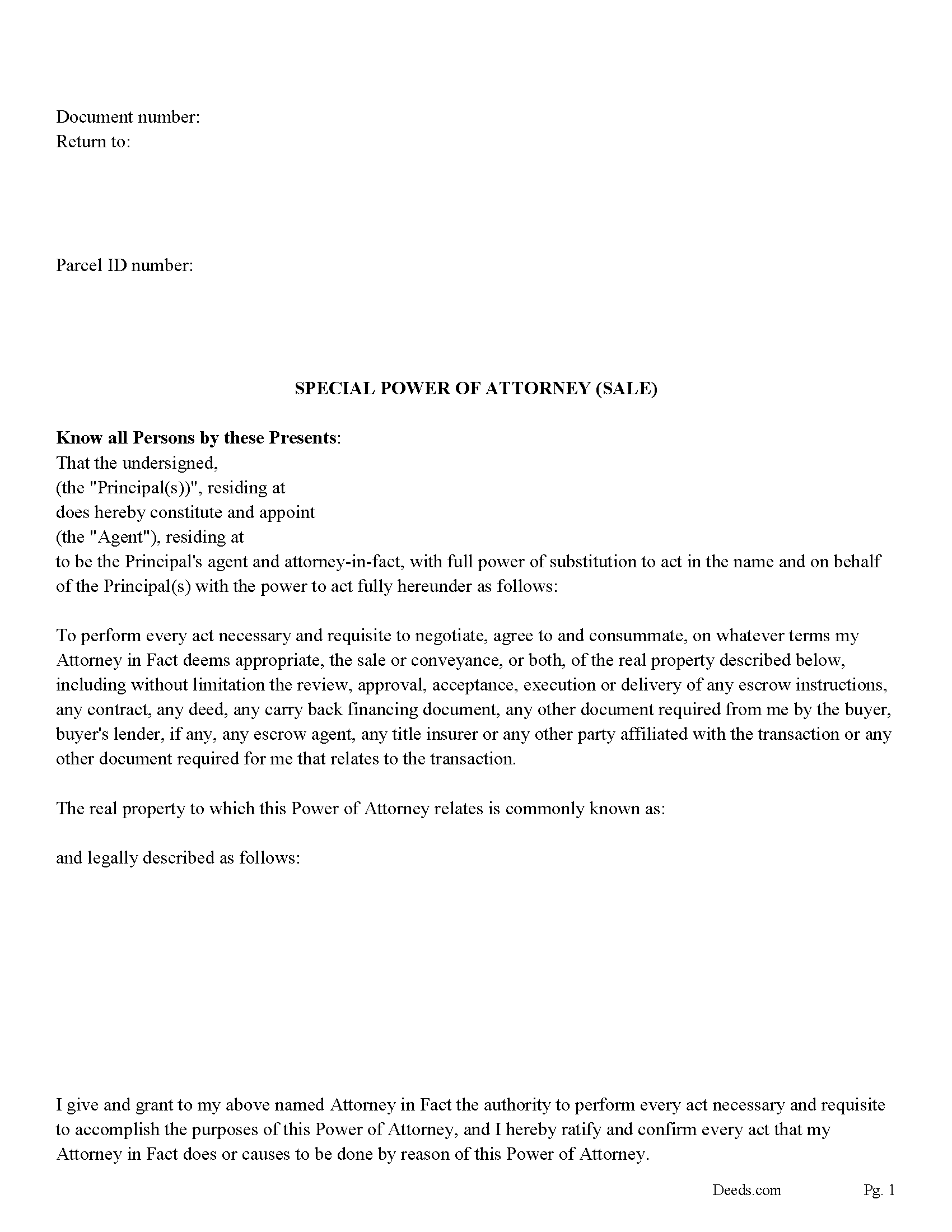
Use this form (Principal) to allow a second party, your Agent, to sell a property on your behalf. Your agent can perform all tasks necessary to sell a specific property located in the State of Wisconsin, in your place and stead as if you were present yourself.
This power of attorney is not affected by any subsequent disability or incapacity of the principal and shall be considered a "Durable Power of Attorney." (ii) shall be governed, as to its validity, terms and enforcement, by those laws of the State of Wisconsin that apply to instruments negotiated, executed, delivered and performed solely within the State of Wisconsin. Terminates upon a date set by the principal.
Agent's Certification Form: Often Third Parties, accepting the power of attorney will require this form. (The following optional form may be used by an agent to certify facts concerning a power of attorney for finances and property.) (Wisconsin revised statute 244.62)
(Wisconsin SPOA-Sale Package includes form, guidelines, and completed example)... More Information about the Wisconsin Power of Attorney for the Sale of Real Estate
Mortgage and Promissory Note
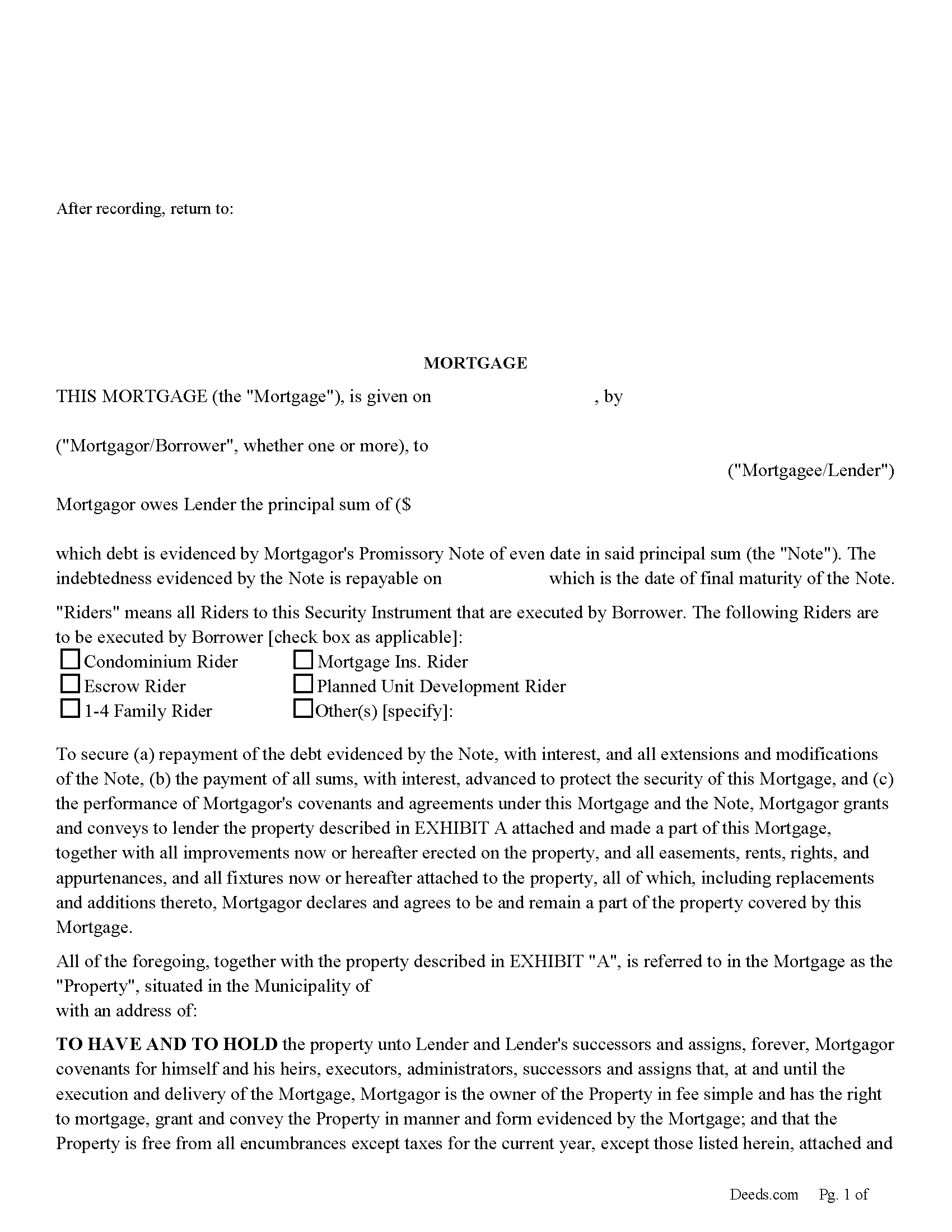
Use this form to finance a condominium, residential property, rental property, small commercial and/or a planned unit development. (A mortgage on real property creates a lien on the property mortgaged; except for the lien and subject to s. 708.11, the mortgagor retains the interest that the mortgagor had at the time of mortgage until that interest is divested by some later act.) (708.01Effect of mortgage.)
This mortgage contains a power of sale, (When a power to sell lands shall be given to the grantee in any mortgage or other conveyance intended to secure the payment of money the power shall be deemed a part of the security and shall vest in and may be executed by any person, who, by assignment or otherwise, shall become entitled to the money so secured to be paid.)( 708.05 Mortgages, power to sell under.)
The promissory note includes interest rates, default rates, late payment fees, default terms, etc. A mortgage and promissory note with strong default clauses and a power of sale, can be beneficial to the lender. Mortgage and the Note are severable.
(Wisconsin Mortgage Package includes forms, guidelines, and completed examples) For use in Wisconsin only.
... More Information about the Wisconsin Mortgage and Promissory Note
Satisfaction of Mortgage
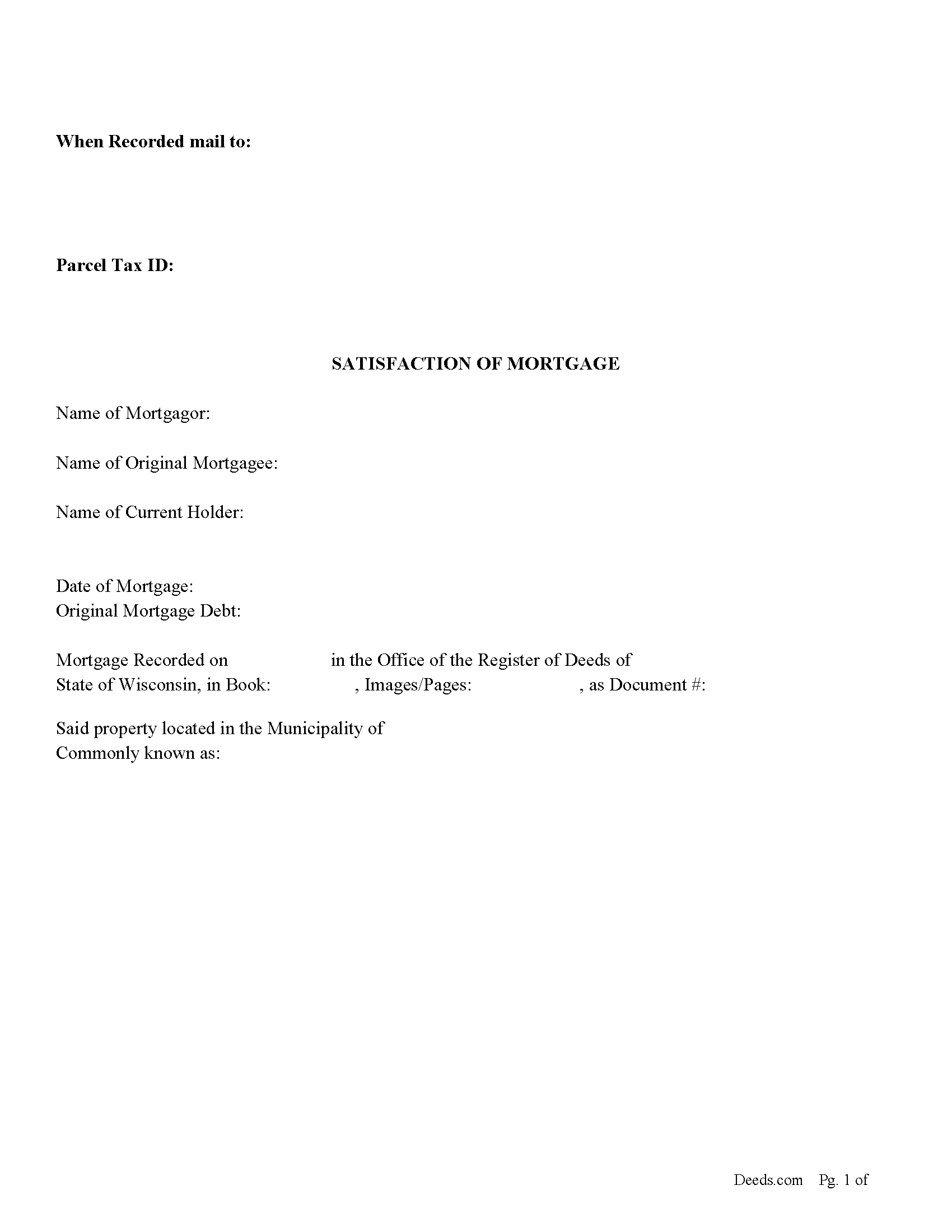
Complete this form and record to satisfy/release an existing mortgage when paid in full.
(A duly recorded certificate signed by or on behalf of the holder of record of any mortgage or other security interest in lands, and authenticated as provided by s. 706.06 or ch. 140 identifying the mortgage or other interest and stating that the same has been paid or satisfied in whole or in part, shall be sufficient to satisfy such mortgage or other interest of record.)( (706.05(8))
To avoid penalty a Secured Creditor generally has (30 days) to satisfy/release a mortgage (after receiving full payment.)( 708.11(5a))
(Wisconsin SOM Package includes form, guidelines, and completed example) For use in Wisconsin only.
... More Information about the Wisconsin Satisfaction of Mortgage
Assignment of Mortgage
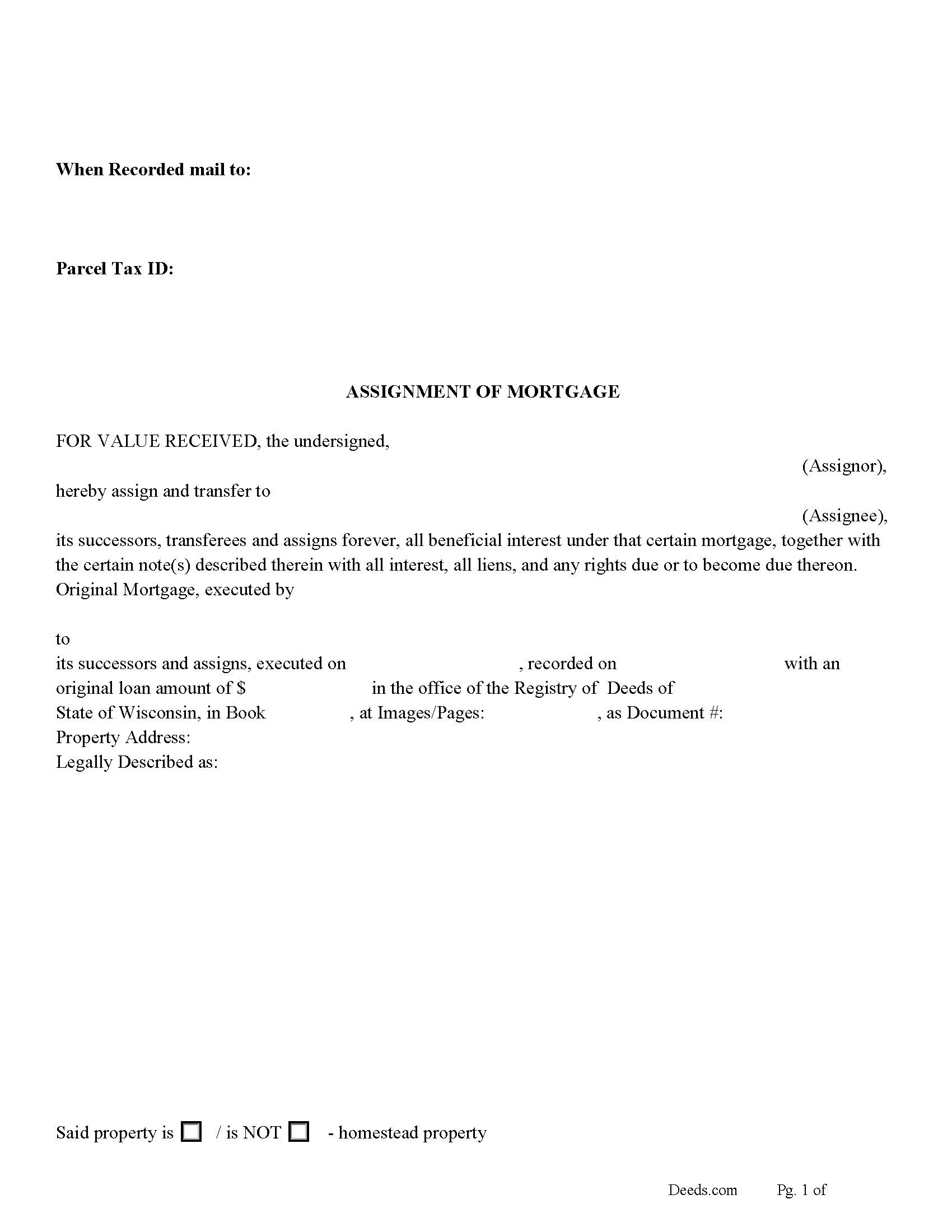
Use this form to transfer/assign a previously recorded mortgage, frequently used when an existing mortgage has been sold. In this form the current holder/assignor of the mortgage assigns it to another party/assignee. To protect lien rights this form is recorded in the Wisconsin Registry of Deeds in the County where the property is located.
Current Borrowers must be notified of the assignment. Notification consists of contact information of the new creditor, recording dates, Wisconsin recording numbers, changes in loan, etc. Included are "Notice of Assignment of Mortgage" forms.
The Truth and lending act requires that borrowers be notified when their mortgage debt has been sold, transferred, or assigned to a new creditor. Generally, within 30 days to avoid up to $2,000.00 in statutory damages, plus reasonable attorney's fees. Systematic violations can reach up $500,000.00.
Section 404 of the Act amends Section 131 of "Truth in Lending Act" to add a new subsection (g) which provides that, in addition to other disclosures required by the TILA, not later than 30 days after the date on which a mortgage loan is sold or otherwise transferred or assigned to a third party, the cr... More Information about the Wisconsin Assignment of Mortgage
Personal Representative Deed
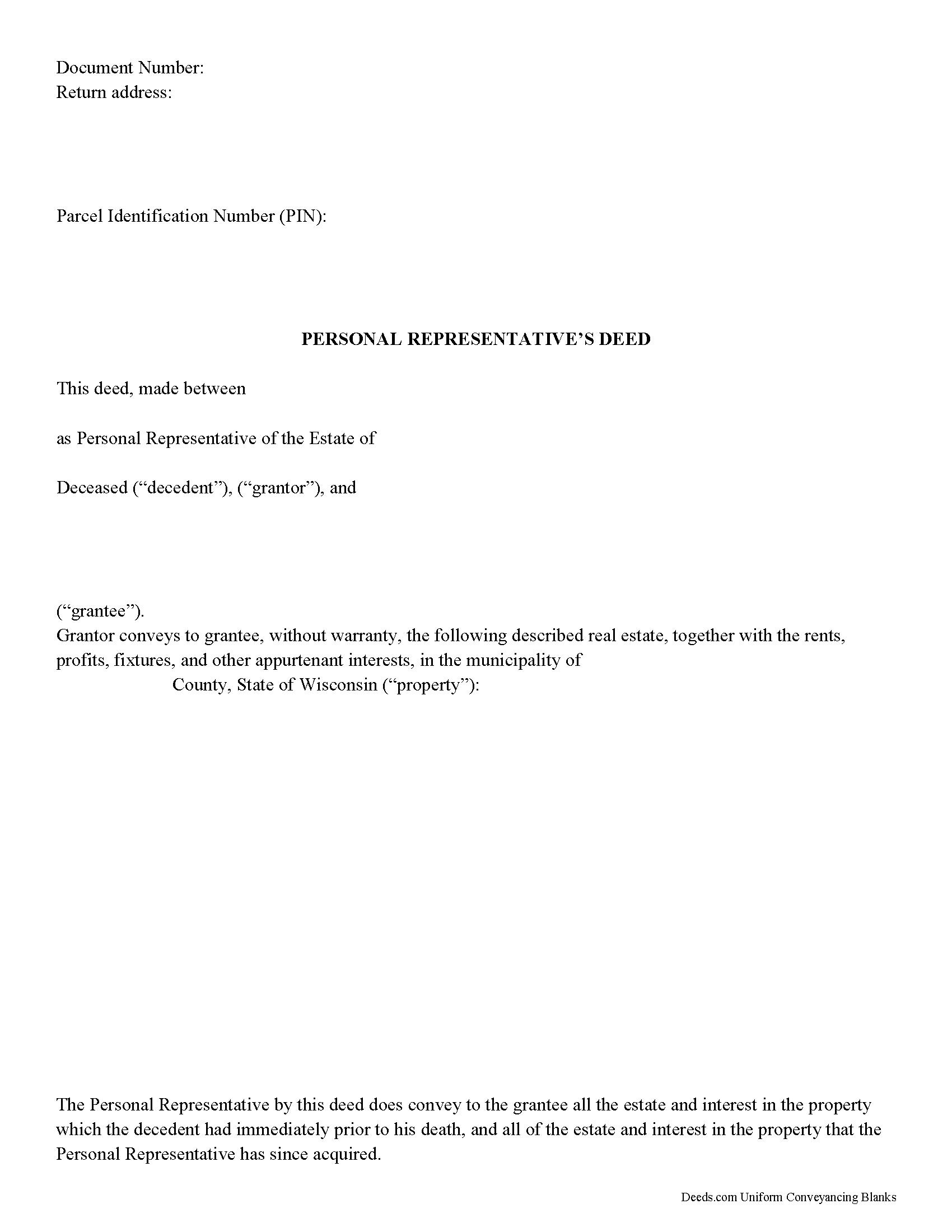
Transfer or Sale of a Decedent's Real Estate in Wisconsin
At its most basic, probate means to prove a decedent's will. The term "probate," however, is frequently used to describe the legal process of estate administration, which includes intestate estate succession in addition to probating wills. Estates are called intestate when the decedent (deceased person) does not leave a will. Probate ensures that a decedent's estate is lawfully transferred pursuant to the provisions of his will or to the state's laws of intestate succession.
Property that does not transfer by means of a survivorship or beneficiary designation is subject to probate. Estates requiring formal or informal probate involve the appointment of a personal representative (PR), a fiduciary appointed by the court to administer the estate in accordance with Wisconsin's Probate Code, located at Chs. 851-882 of the Wisconsin Statutes. This article will focus on informal administration; formal administration may be necessary depending on such factors as specifications in the will and whether all persons having an interest in the estate agree on the administration. Consult a lawyer with questions.
The first step to ... More Information about the Wisconsin Personal Representative Deed
Termination of Decedent Property Interest
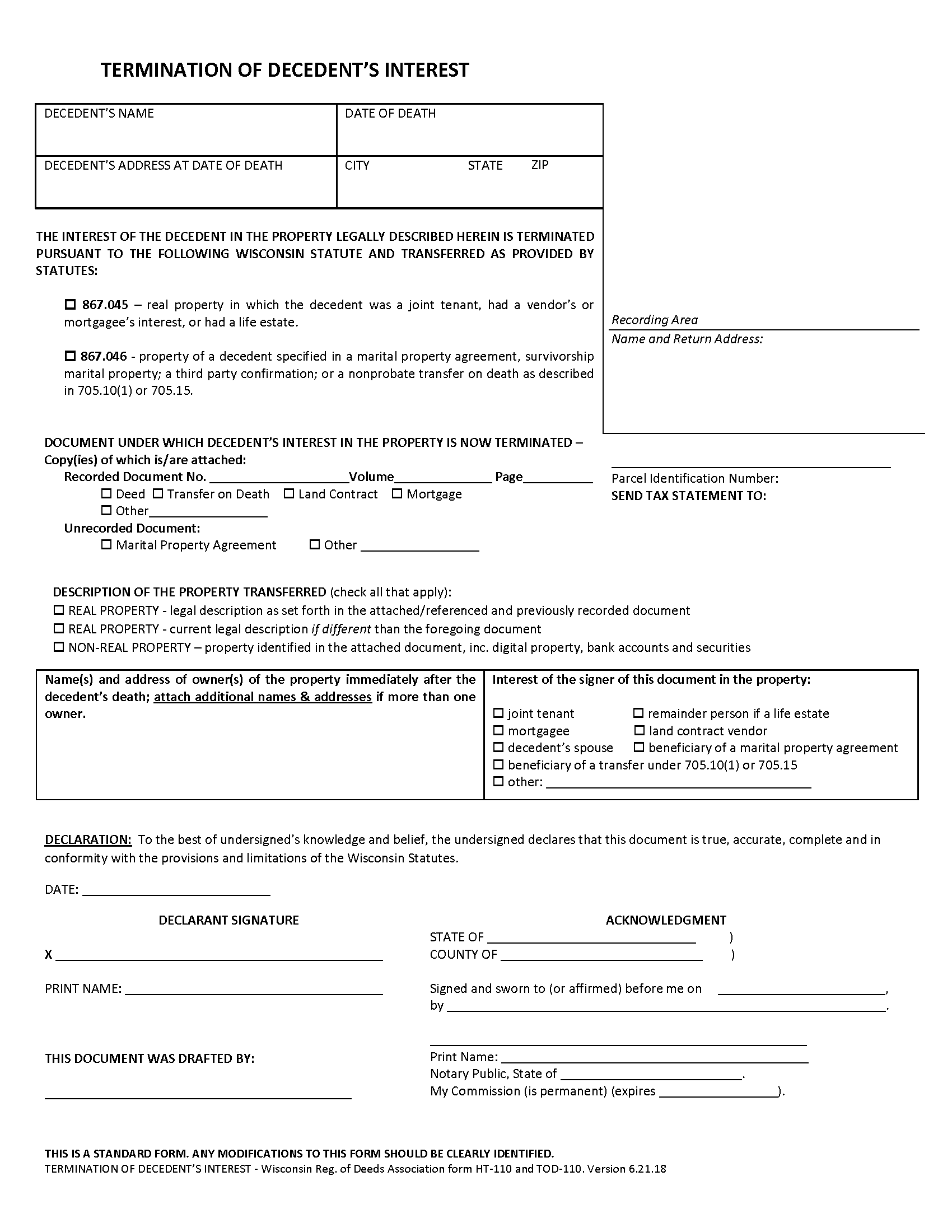
Removing a Deceased Joint Tenant from a Wisconsin Real Estate Deed
Wisconsin laws provide that two or more people may hold real estate as joint tenants with right of survivorship. If one joint tenant dies, his/her share of the property is distributed evenly amongst the remaining co-owners without the need to pass through probate.
To terminate the decedent's interest in the property and to complete the distribution, file a form HT-110 under Wis. Stat. 867.045, with the register of deeds for the county where the property is located.
Recording the form formalizes the transfer of property rights, but the deceased joint tenant's name will still appear on the deed. Complete and record an updated deed from all joint tenants, but identify the deceased co-owner, and convey the property to the survivors only. It might be necessary to provide copies of the original deed, the death certificate, and the recorded HT-110 when submitted the revised deed.
(Wisconsin TODPI Package includes form, guidelines, and completed example)
... More Information about the Wisconsin Termination of Decedent Property Interest
Transfer on Death Deed
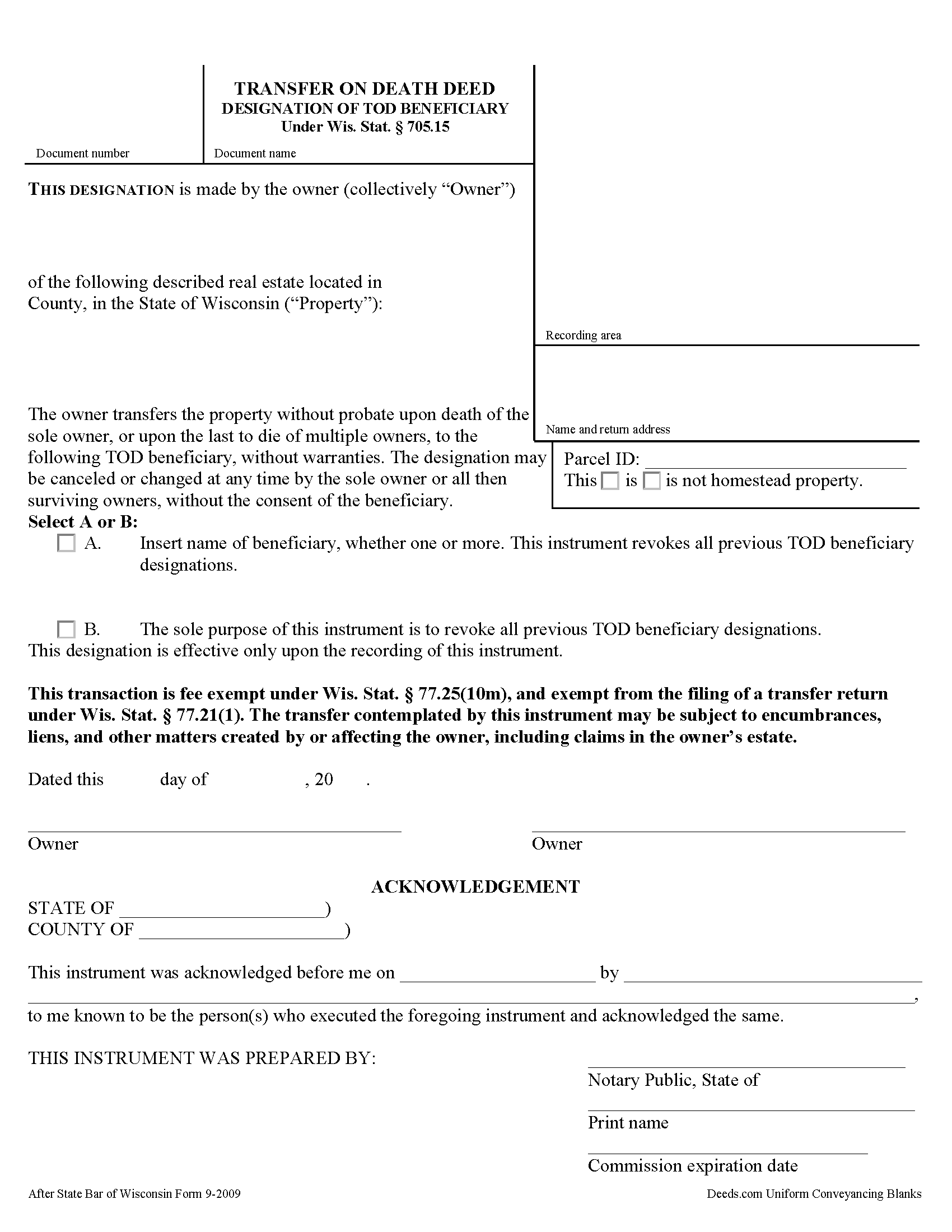
Under Wisconsin Statutes section 705.15, owners of real property in Wisconsin may designate one or more people to gain ownership of their property outside of the probate process. The transfer on death deed form contains the designation and must be recorded, DURING THE OWNER'S NATURAL LIFE, for validity.
By executing and recording a transfer on death beneficiary designation, the owner retains absolute control over the real estate, and may sell, mortgage, or use the property in any legal manner, and change or revoke the beneficiary designation without penalty or obligation to inform the beneficiary.
Because the transfer does not occur until after the owner's death, there is no transfer tax due when recording the deed under 77.21(1) and 77.25(10m). While the change in ownership happens as a function of law when the owner dies, when the beneficiary claims the land, he or she must record form TOD-110 to make the transfer official and enter the updated information into the public records.
Wisconsin's transfer on death deeds are useful estate planning tools. Even so, carefully consider the potential impact of a non-probate transfer of property on taxes, as well as eligibility f... More Information about the Wisconsin Transfer on Death Deed
Transfer on Death to Beneficiary
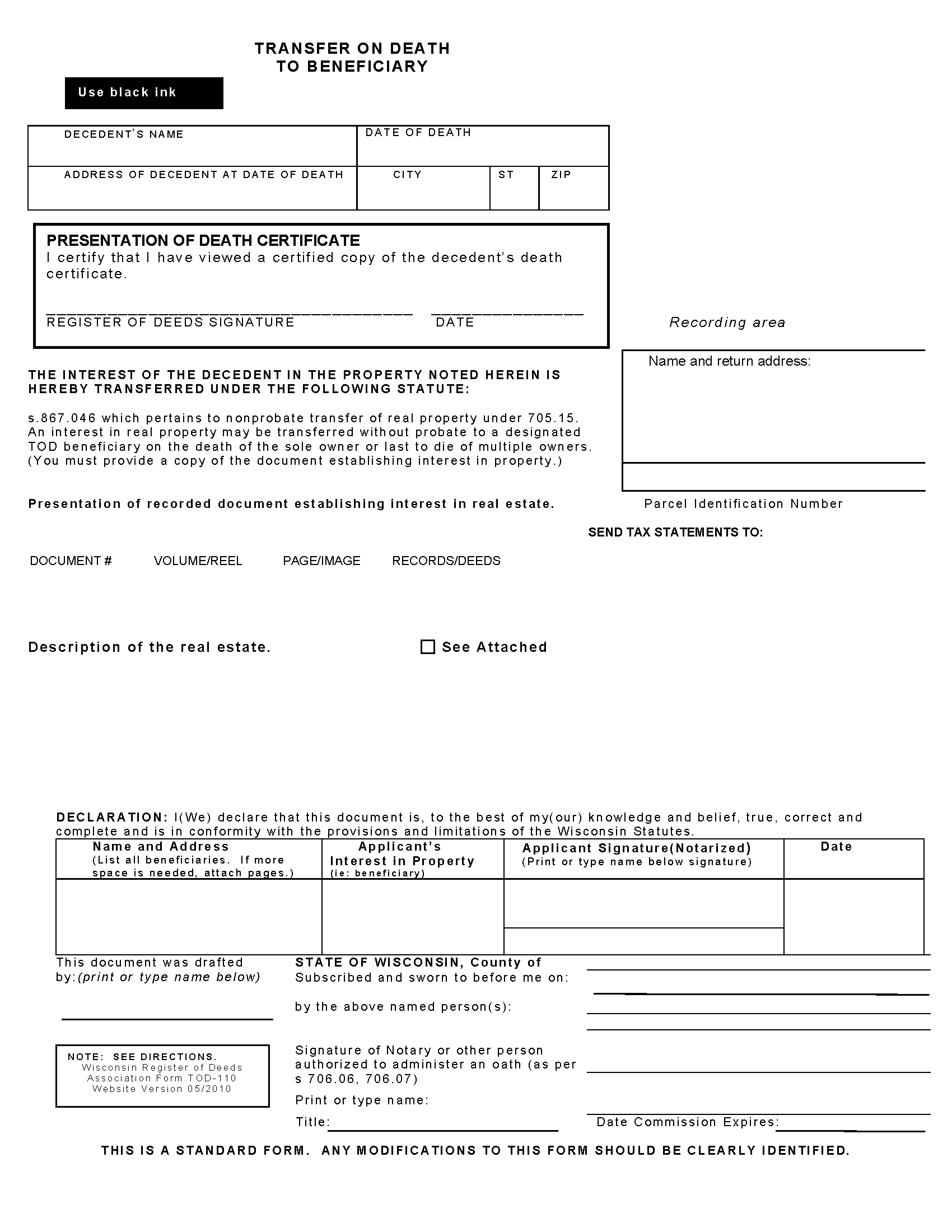
Transfer to Beneficiary -- TOD-110
Completing the Change of Property Rights from a Wisconsin Transfer on Death Deed
When a grantor/owner of real estate under a Wisconsin transfer on death deed dies, the named beneficiary or beneficiaries gain the rights to the property by function of law. Even though this transfer is, in theory, automatic, the best way to ensure accurate and up-to-date ownership records is to file a completed and notarized transfer on death to beneficiary form TOD-110 with the register of deeds for the county where the land is located. By recording this document, the new owner formalizes the transfer and provides public notice of the new status.
(Wisconsin TOD to Beneficiary Package includes form, guidelines, and completed example)... More Information about the Wisconsin Transfer on Death to Beneficiary
Contractor Notice of Intent to File Lien
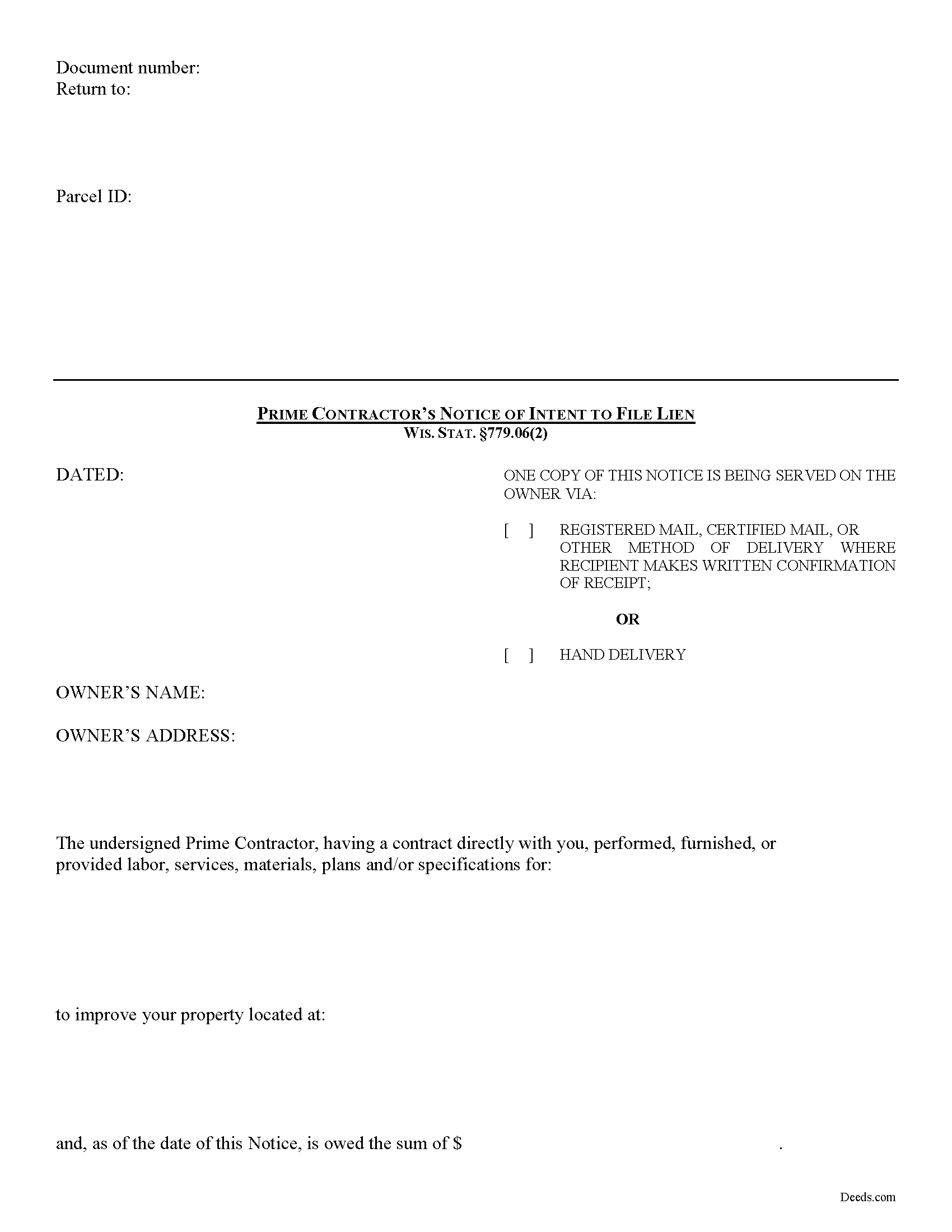
Pre-Lien Notices in Wisconsin
Preliminary notices are an important step to securing a mechanic's lien and are often required to ensure the property owner has notice of who is working on his or her property so there is a chance to avoid a lien. Most states mandate the form of notice that must be provided. In Wisconsin, prime contractors are required to serve a notice of intent to file a construction lien
In Wisconsin, a claimant cannot claim a lien right or maintain an action to enforce a lien right, unless the lien claimant serves written notice on the owner of an intent to file a lien claim at least 30 days before timely filing the lien claim. Wis. Stat. 779.06(2). The notice is required whether or not the claimant has been required to and has given a previous notice of furnishing. Id. The notice must briefly describe the nature of the claim, the amount due and the land and improvement to which it relates. Id.
This article is provided for informational purposes only and should not be relied upon as a substitute for the advice from a legal professional. Please contact an attorney with questions about sending a notice of intent to file a lien, or for any other issues relat... More Information about the Wisconsin Contractor Notice of Intent to File Lien
Contractor Claim of Lien
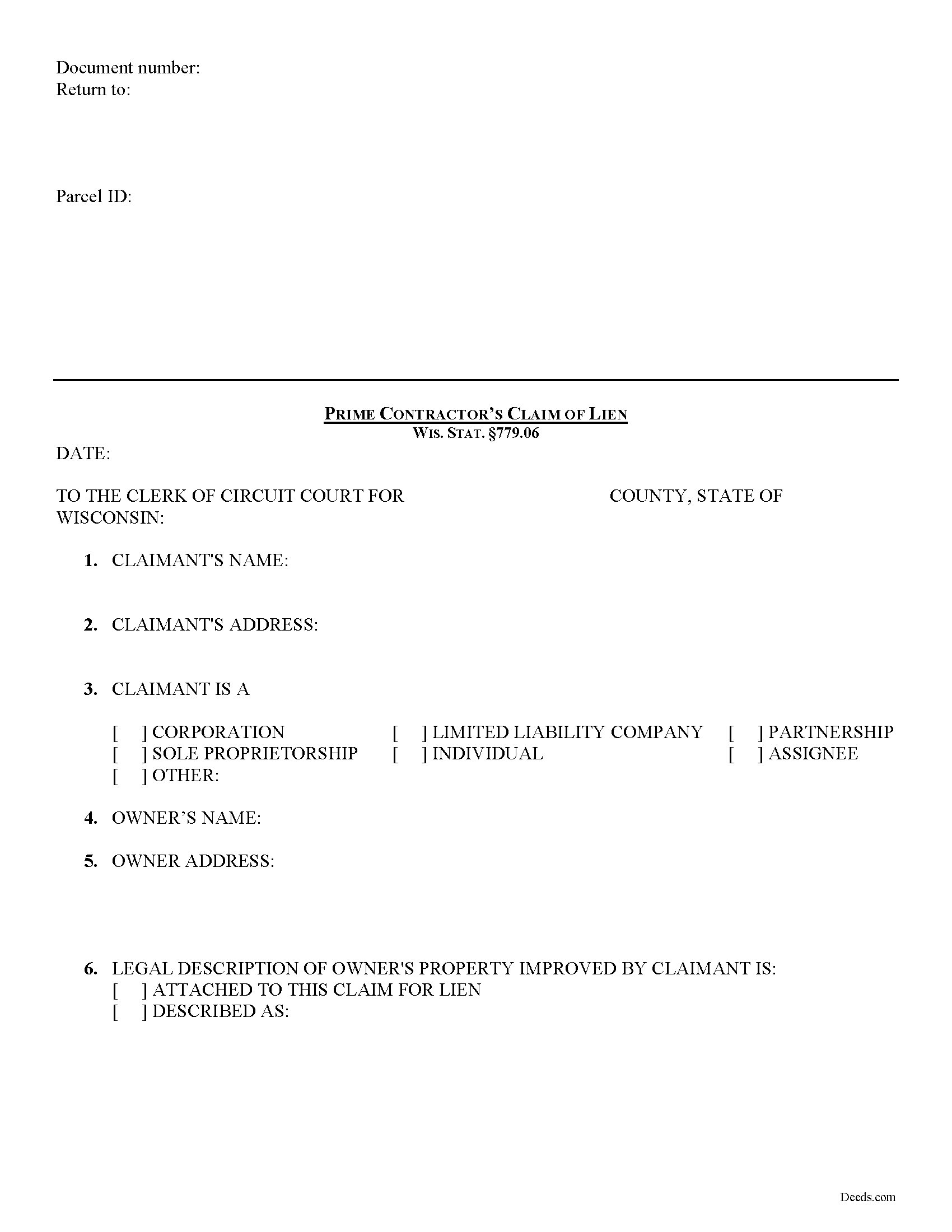
Prime Contractor Lien Claims in Wisconsin
Mechanic's Liens place a block or burden on a property owner's title when a claimant (such as a contractor, materials supplier, or other laborer such as a subcontractor) has not been paid for labor, materials, or equipment provided. In Wisconsin, mechanic's liens are governed under Chapter 779 of the state legislative code.
To claim a lien in Wisconsin, the claimant must file a claim of lien with the office of the clerk of courts in the county where the property is located. WIS. STAT. 779.06(1). The claim must be filed within six (6) months from the last date the lien claimant performed, furnished, or procured labor, services, materials, plans, or specifications. Id
The lien claimant must also serve a copy of the claim for lien on the owner of the property on which the lien is placed within thirty (30) days after filing the claim. Id.
No lien claim may be filed unless, at least 30 days before timely filing of the lien claim, the lien claimant has served the owner with a written notice of intent to file a lien claim. WIS. STAT. 779.06(2). The notice is required to be given whether or not the claimant has been required to and has ... More Information about the Wisconsin Contractor Claim of Lien
Subcontractor Identification Notice
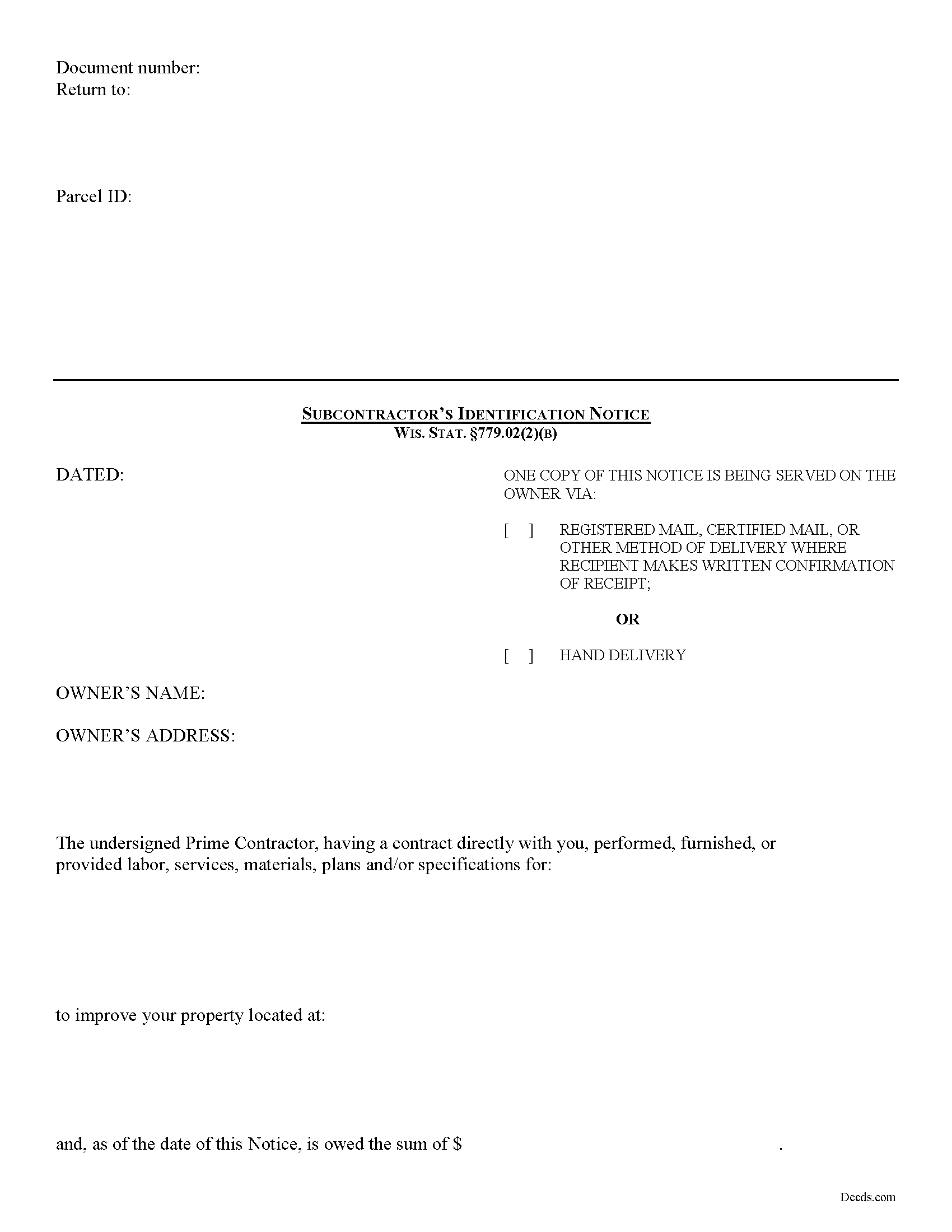
Subcontractor Lien Claims in Wisconsin
Subcontractors must provide preliminary notice to the owner of a property to claim a mechanic’s lien to recover any owed funds. This step is required to protect the owner from any hidden liens by informing he or she of all the parties involved in a construction project.
Every person other than a prime contractor (including a subcontractor) who performs, furnishes, or procures labor, materials, plans, or specifications for an improvement is entitled to have the lien and remedy only if within sixty (60) days after performing, furnishing, or procuring the first labor, services, materials, plans, or specifications the person serves two signed copies of a written notice, on the owner or authorized agent at the last-known post-office address. Wis. Stat. §779.02(2)(b).
The owner or agent shall provide a copy of the notice received, within ten (10) days after receipt, to any mortgage lender who is furnishing or is to furnish funds for construction of the improvement to which the notice relates. Id.
This article is provided for informational purposes only and should not be relied upon as a substitute for the advice from a legal p... More Information about the Wisconsin Subcontractor Identification Notice
Subcontractor Notice of Intent to File Lien
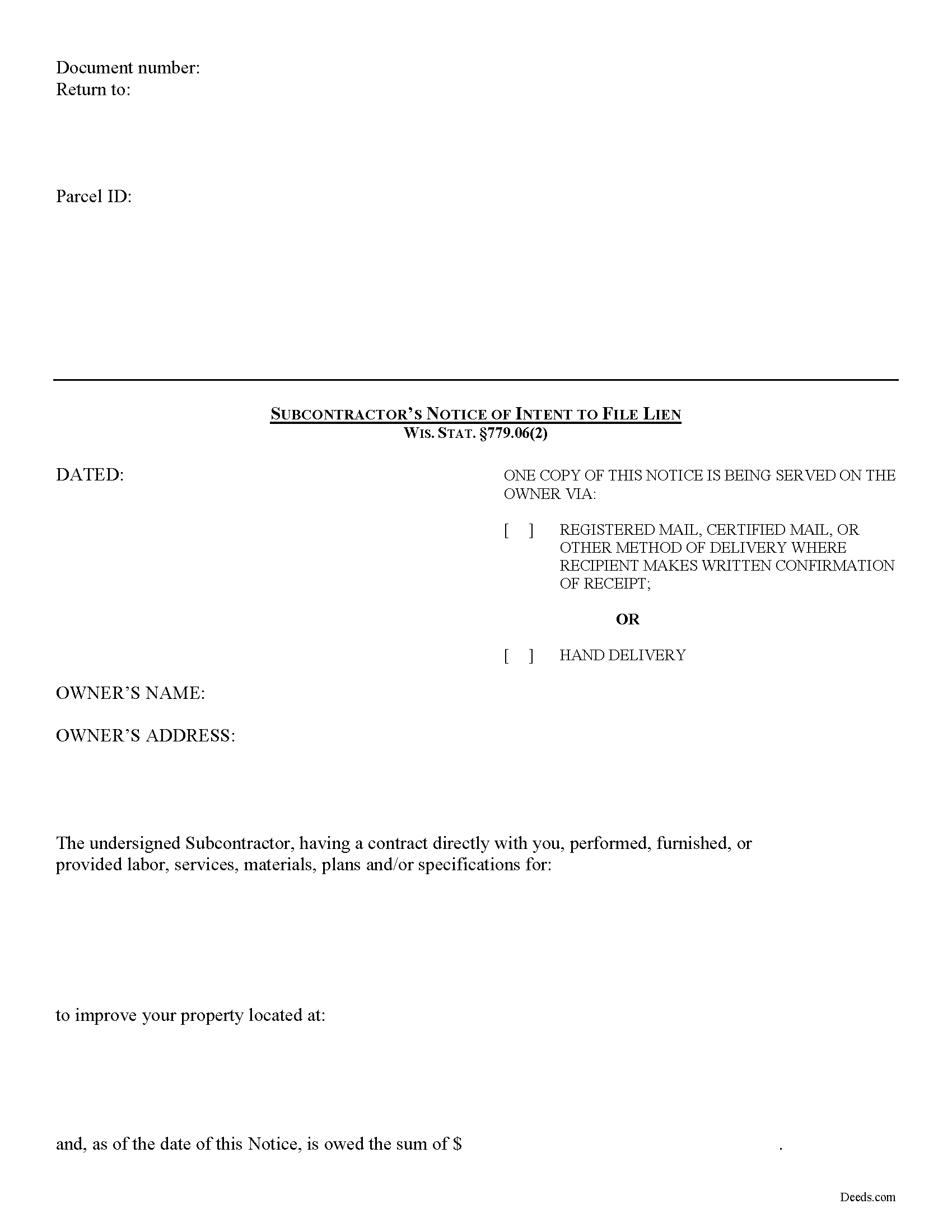
Subcontractor Preliminary Notice in Wisconsin
In Wisconsin, subcontractors may only make a lien claim if they submit a Notice of Intent to File a Lien within statutory time limits.
No lien claim may be filed or action brought thereon unless, at least thirty (30) days before timely filing of the lien claim, the lien claimant serves on the owner a written notice of intent to file a lien claim. WIS. STAT. 779.06(2). The notice is required to be given whether or not the claimant has been required to and has given a previous notice. Id. It also briefly describes the nature of the claim, its amount, and the land and improvement to which it relates. Id.
This article is provided for informational purposes only and should not be relied upon as a substitute for the advice from a legal professional. Please contact an attorney with questions about preliminary notice by a subcontractor, or any other issues related to liens in Wisconsin.... More Information about the Wisconsin Subcontractor Notice of Intent to File Lien
Subcontractor Claim of Lien
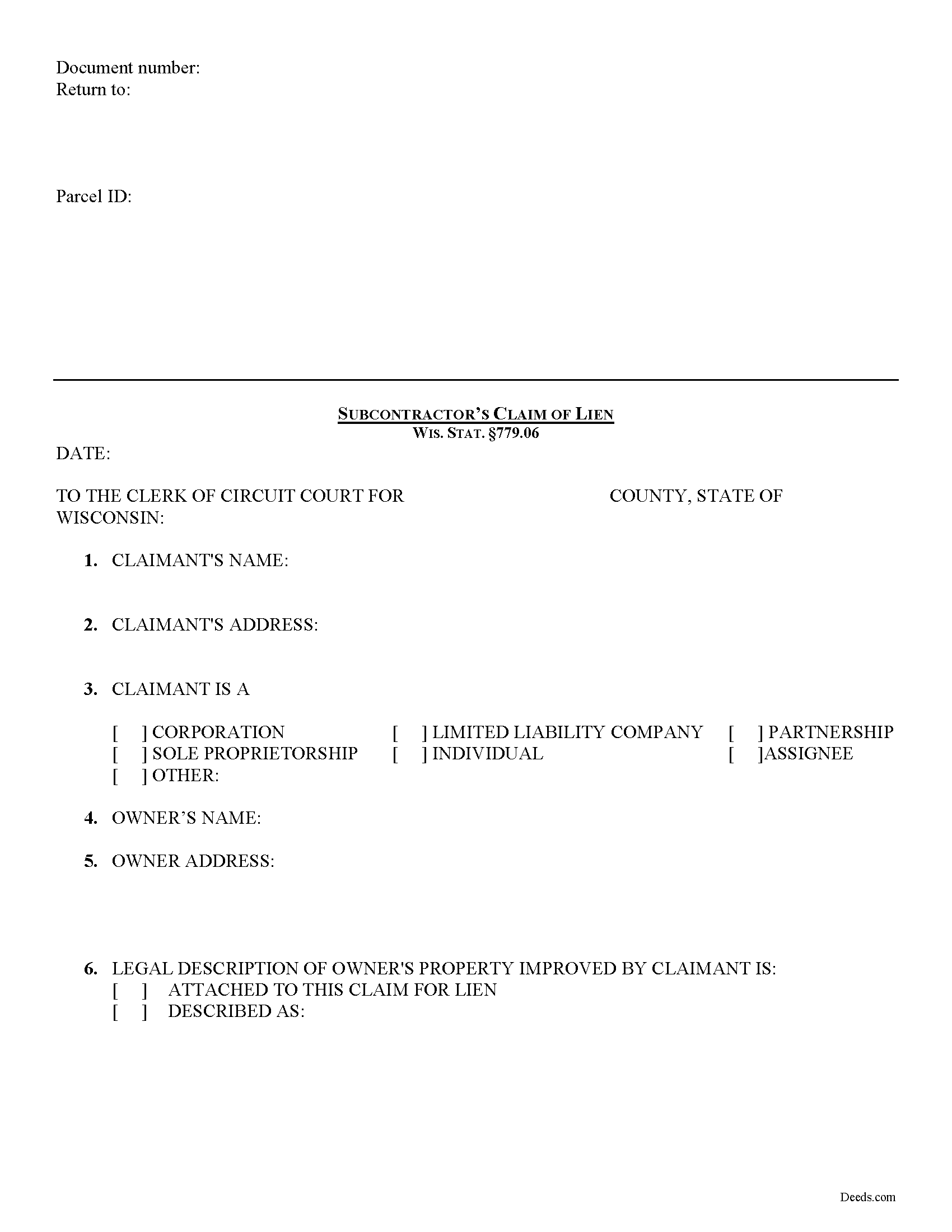
Subcontractor Lien Claims in Wisconsin
Wisconsin law authorizes subcontractors to use a mechanic's lien to place a block or burden on a property owner's title if they have not been paid for labor, materials, or equipment provided. Mechanic's liens are governed under Chapter 779 of the Wisconsin legislative code.
To claim a lien, the subcontractor must file a claim of lien form with the office of the clerk of courts in the county where the property is located. WIS. STAT. 779.06(1). The claim must be filed within six (6) months from the last date the sub performed, furnished, or procured labor, services, materials, plans, or specifications. Id
The subcontractor must also serve a copy of the claim for lien on the owner of the property on which the lien is placed within thirty (30) days after filing the claim. Id.
No lien claim may be filed unless, at least 30 days before timely filing of the lien claim, the sub has first served the owner with a written notice of intent to file a lien claim. WIS. STAT. 779.06(2). The notice is required to be given whether or not the sub has been required to and has given any previous notice. Id. The notice must briefly describe the nature o... More Information about the Wisconsin Subcontractor Claim of Lien
Construction Lien Waiver
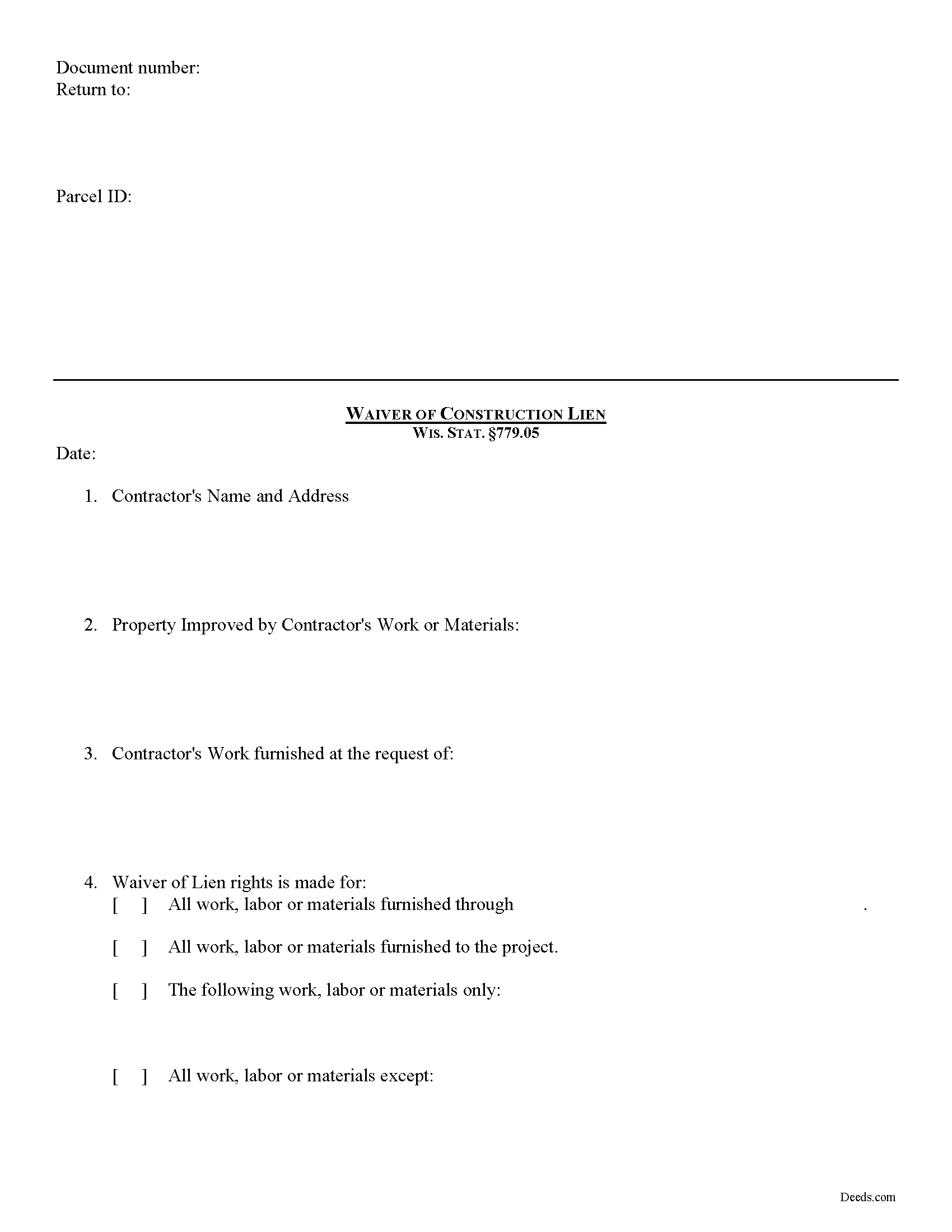
Lien Waivers in Wisconsin
Lien waivers are used to simplify payments between contractors, subcontractors, customers, and property owners. A waiver is a known forfeiture of a legal right. In this case, the person granting the waiver forfeits the right to seek a mechanic's lien for all or part of the amount due.
Unlike other states, Wisconsin outlines a broad array of waiver rights and the law does not require verification of payment before the waiver takes effect. Any document signed by a lien claimant or potential claimant and purporting to be a waiver of construction lien right, is valid and binding as a waiver whether or not consideration was paid therefor and whether the document was signed before or after the labor, services, materials, plans, or specifications were performed, furnished, or procured, or contracted for. WIS. STAT. 779.05(1). Any ambiguity in such document shall be construed against the person signing it. Id.
Any waiver document shall be deemed to waive all lien rights of the signer for all labor, services, materials, plans, or specifications performed, furnished, or procured, or to be performed, furnished, or procured, by the claimant at any time for ... More Information about the Wisconsin Construction Lien Waiver
Construction Lien Release
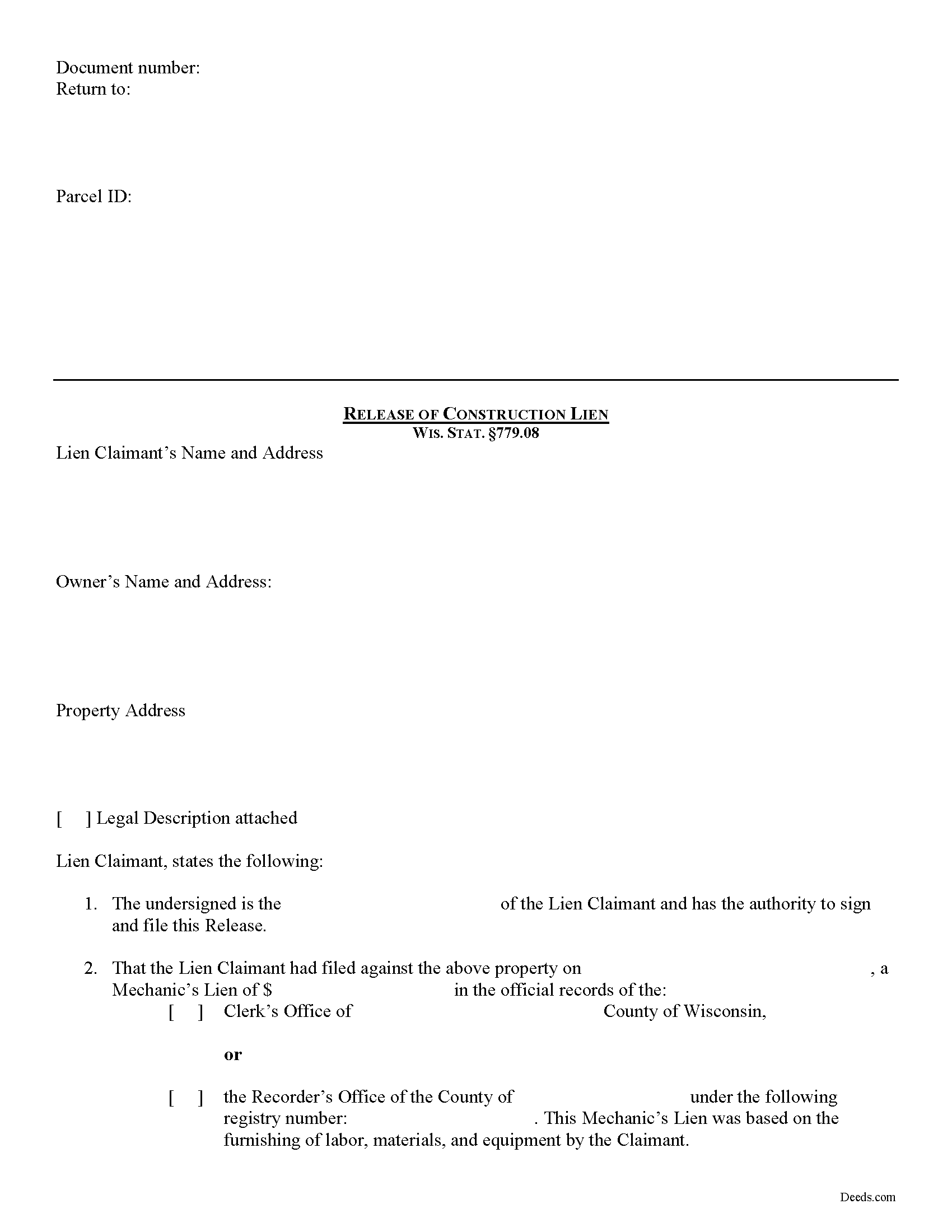
Releasing a Lien in Wisconsin
Property subject to a mechanic's lien should be released when the owner posts a bond or other surety to guarantee payment of the underlying lien. In exchange for posting the bond, the lien claimant should file a release with the clerk of court. Property should also be released when a lien is satisfied as a matter of course.
To release a lien, a surety bond must be posted in a value equal to 125 percent of the claim for lien. See Wis. Stat. 779.08(1). The court shall determine any question of sufficiency of the surety if an exception is taken by the lien claimant. Id.
The clerk of court shall remove the lien from the judgment and lien docket upon the court's order approving the surety in substitution for the lien. Id.
Issuing a release is required by law when the lien is no longer justified. Every lien claimant, or the attorney who executed and filed a claim for lien on the claimant's behalf, who has received satisfaction or tender of the claim with the costs of any action brought on the claim shall, at the request of any person interested in the premises affected and on payment of the costs of satisfying the same, execute and deliver the ... More Information about the Wisconsin Construction Lien Release
Trustee Deed
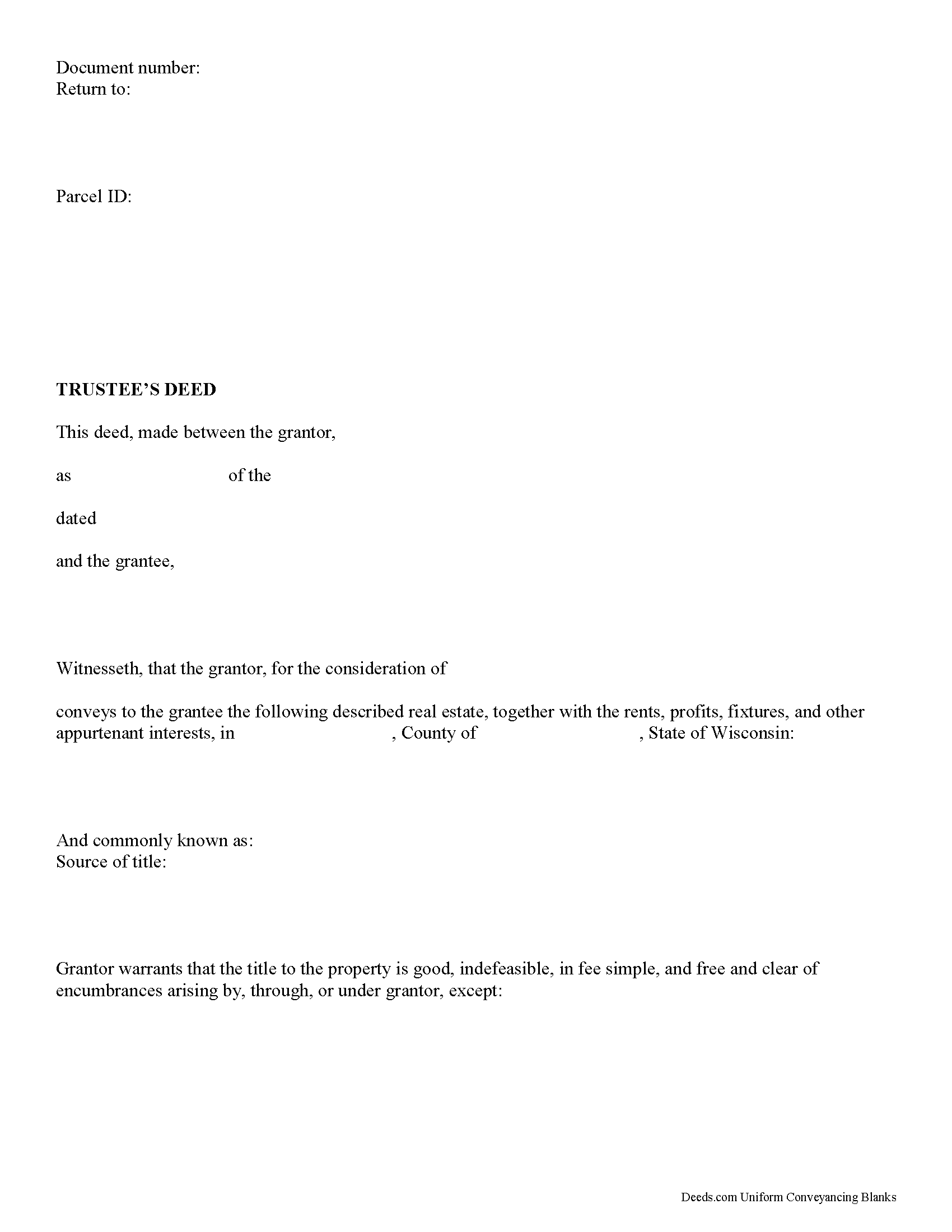
In a living trust, a grantor (settlor) transfers title to property to another person (trustee) for the benefit of a third (beneficiary). A settlor often serves as the original trustee (sometimes along with a spouse) and initial beneficiary of a living trust during his lifetime, and nominates a successor to take over fiduciary duties upon his death or incapacity, though this is not always the case. The settlor establishes the trust by executing a trust document, an unrecorded instrument outlining the scope and terms of the trust, including the settlor's estate plans. In transfers of real property into trust, the settlor executes a deed titling the property in the name of the trustee on behalf of the trust.
In order to convey real property from the trust during the settlor's lifetime, the trustee must execute a deed vesting title in the name of the grantee. In Wisconsin, a trustee's deed is a special warranty deed that has simply been named after the capacity of the granting party. The trustee's deed is identical in form to a special warranty deed, supplying in addition the name and date of the trust on behalf of which the grantor is conveying title. The deed contains the language... More Information about the Wisconsin Trustee Deed
Disclaimer of Interest
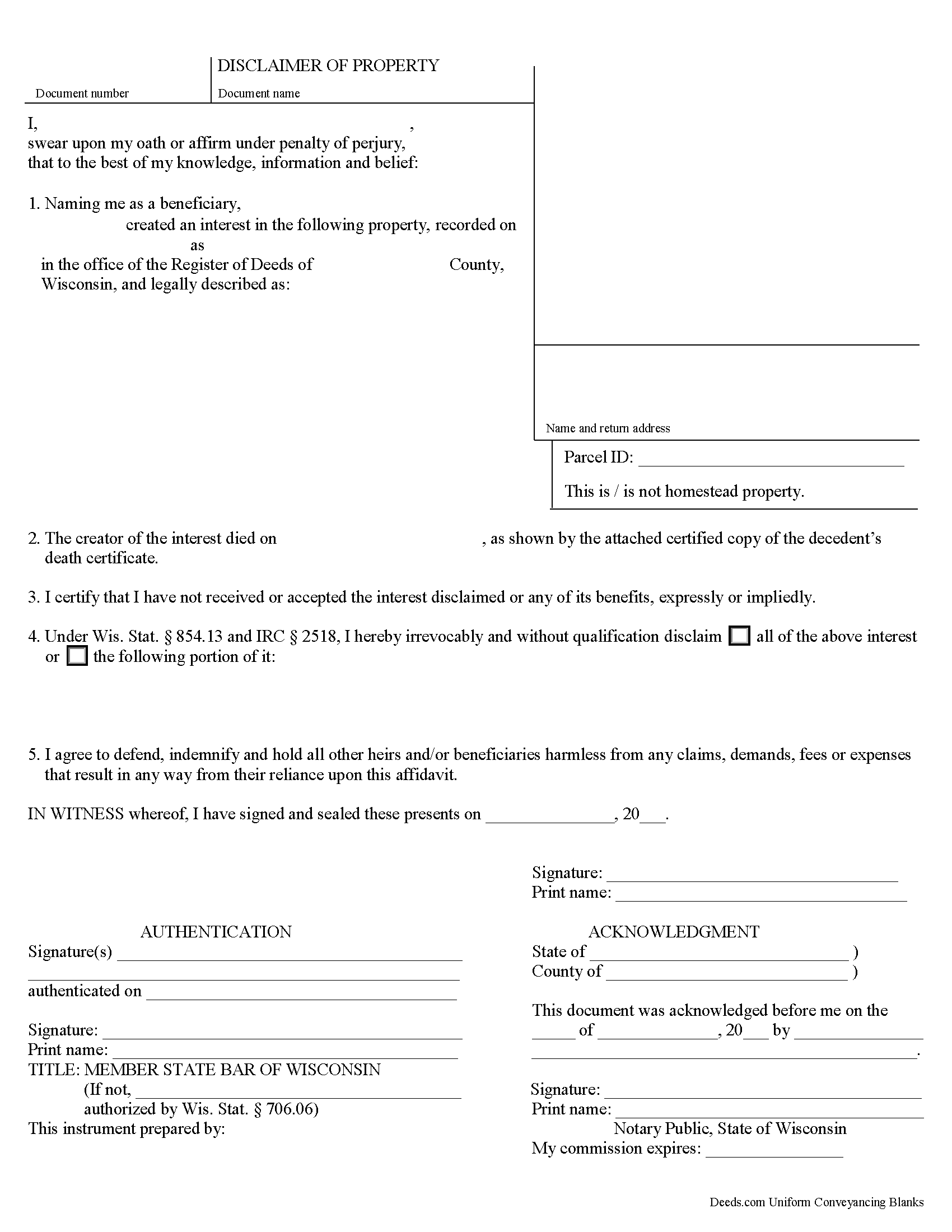
Under the Code of Wisconsin, the beneficiary of an interest in property may renounce the gift, either in part or in full (Wis. Stat. 854.13 (2) (d)). Note that the option to disclaim is only available to beneficiaries who have not acted in any way to indicate acceptance or ownership of the interest.
The disclaimer must be in writing and include a description of the interest, a declaration of intent to disclaim all or a defined portion of the interest, and be signed by the disclaimant (Wis. Stat. 854.13 (3)).
Deliver the disclaimer within nine months of the transfer (e.g., the death of the creator of the interest) to the personal representative or the special administrator of the deceased transferor and file a copy with the probate court that has jurisdiction (Wis. Stat. 854.13 (5) (c)). In the case of real property, a copy of the disclaimer may also be recorded in the office of the register of deeds of the county in which the property is located (Wis. Stat. 854.13 (5) (e)).
A disclaimer is irrevocable and binding for the disclaiming party and his or her creditors, so be sure to consult an attorney when in doubt about the drawbacks and benefits of disclaiming inheri... More Information about the Wisconsin Disclaimer of Interest
Certificate of Trust
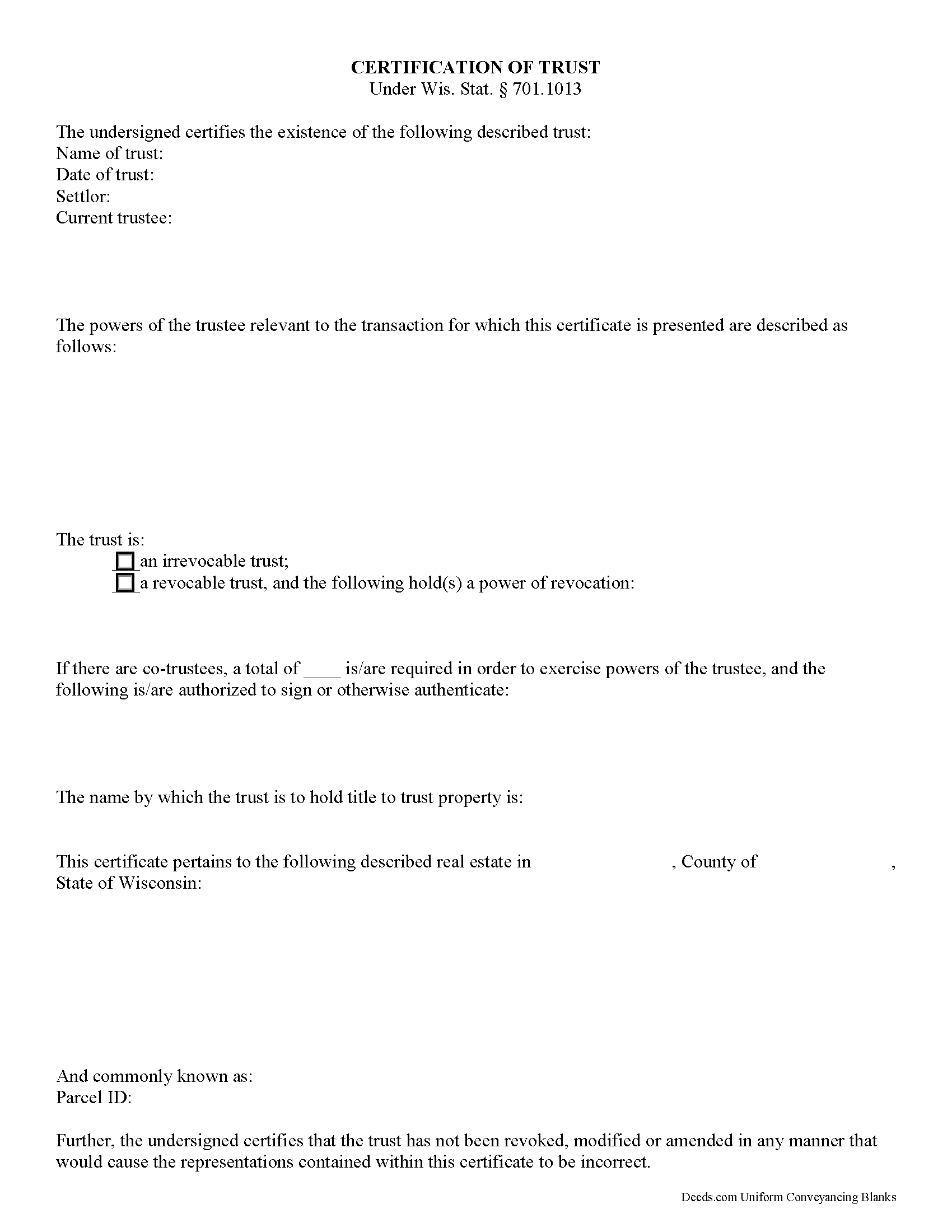
The certificate of trust is an unrecorded document executed by a trustee and presented to a party doing business with the trustee (such as a financial institution). The document is codified as part of the Wisconsin Trust Code at Wis. Stat. 701.1013.
In a trust arrangement, a settlor transfers assets another person who, as trustee, manages them for the benefit of the trust beneficiary. In lieu of presenting the entire trust instrument, which generally goes unrecorded in order to protect the settlor's estate plans, the certificate is an abstract containing only the information required of the trustee in order to conduct the business at hand. The document certifies that the trust exists and that the trustee has the authority to act in the pending transaction on behalf of the trust.
The certificate includes a statement that the trust exists and contains the name and date of the trust; the names of the settlor and all currently acting trustees; an inventory of the relevant powers of the trustee; and the name by which the trust vests title to property. The form also identifies anyone who holds a power to revoke the trust, and, when there are co-trustees, stipulates the authority o... More Information about the Wisconsin Certificate of Trust
Lis Pendens
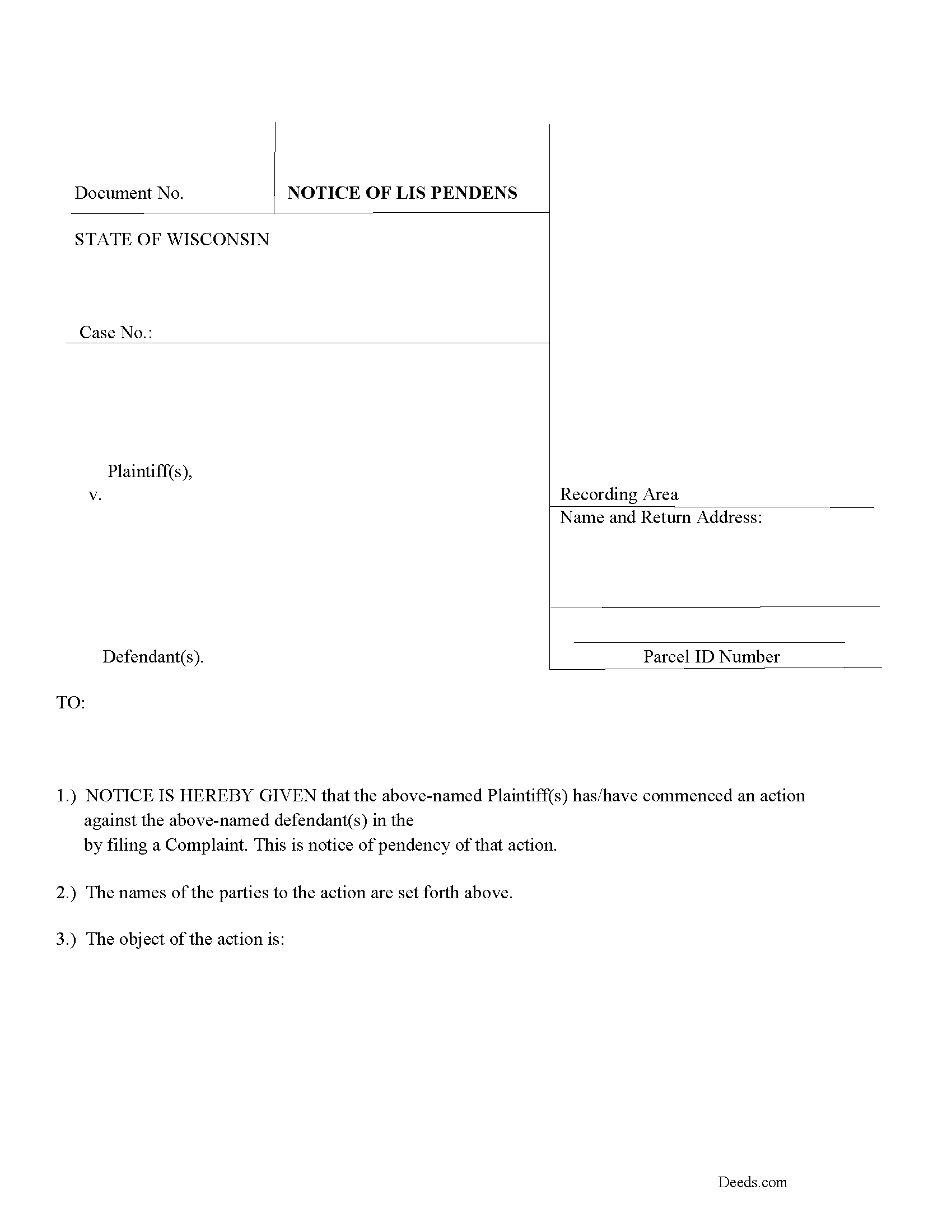
After a complaint is filed that (might confirm or change interests in the real property) the Plaintiff shall record a Lis Pendens in the county or (each county where any part) of the property lies. The Lis Pendens will be recorded with the Registry of Deeds of said county.
The Lis Pendens will contain:
The names of the parties involved
The object of the legal action taken
A legal description of the affected property.
Once recorded the Lis Pendens becomes constructive notice to would be (purchasers and encumbrancers.) After the Lis Pendens is filed any subsequent purchaser or encumbrancer will be bound by the proceedings as if they were a party to the action. Statute 840.10
(Wisconsin LP Package includes form, guidelines, and completed example) For use in Wisconsin only.
... More Information about the Wisconsin Lis Pendens
Release of Lis Pendens
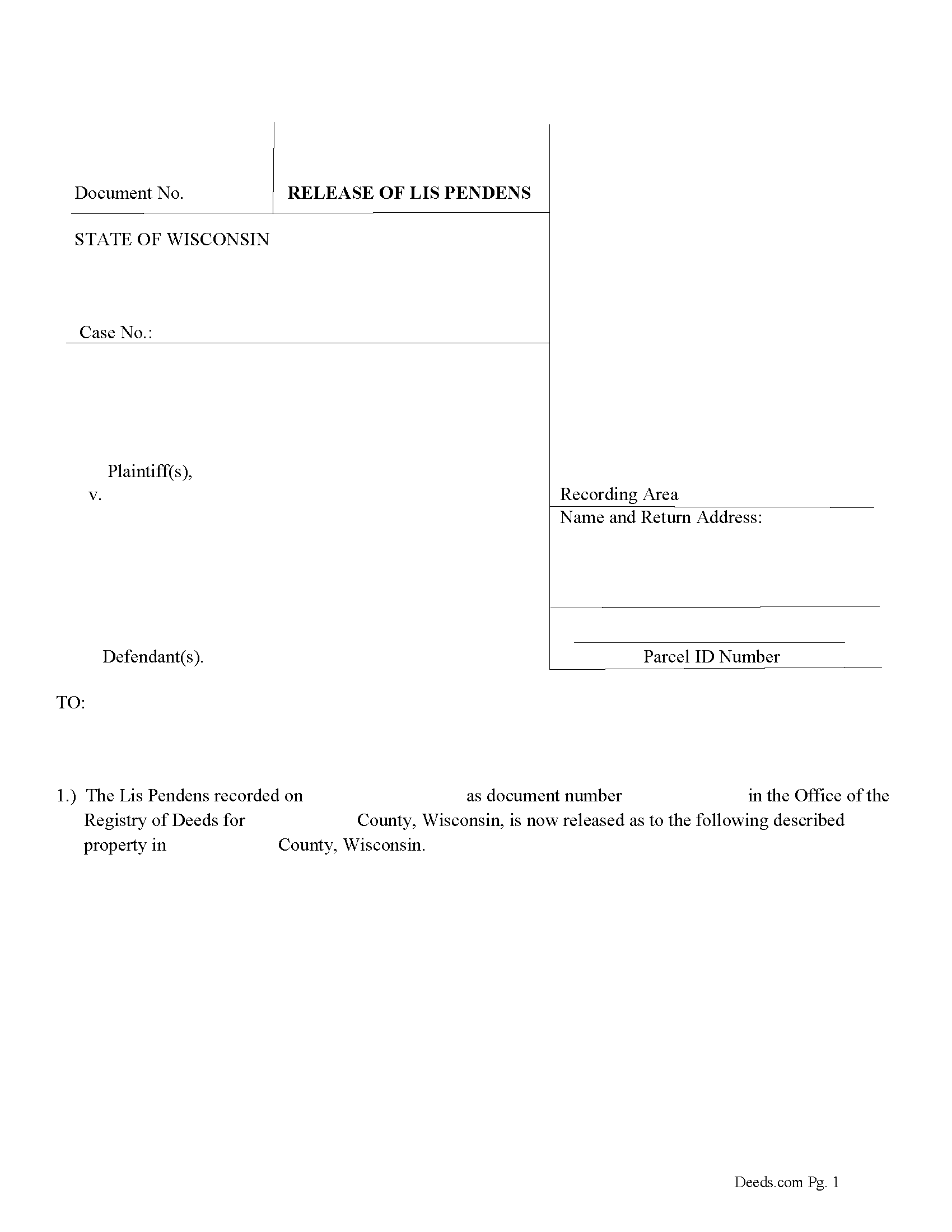
Use this form to release a previously recorded Lis Pendens.
For use in Wisconsin only.
(Wisconsin Release of LP Package includes form, guidelines, and completed example)... More Information about the Wisconsin Release of Lis Pendens